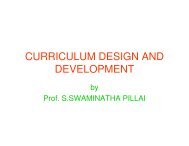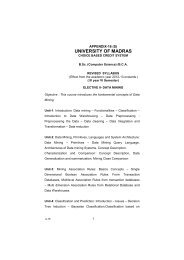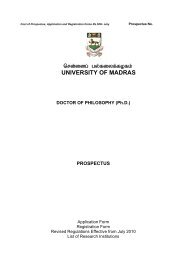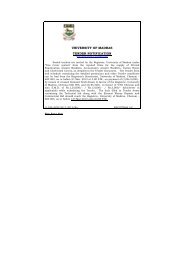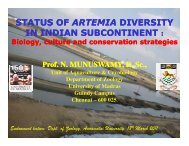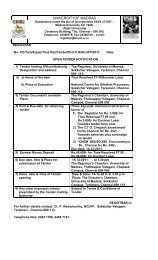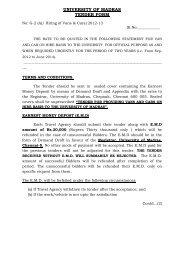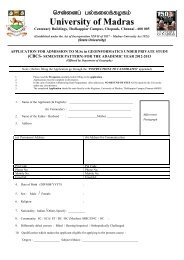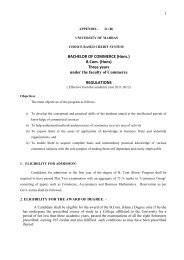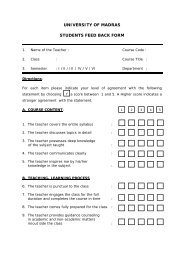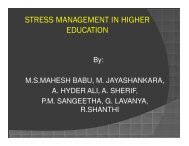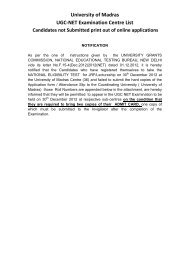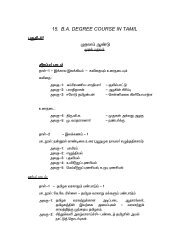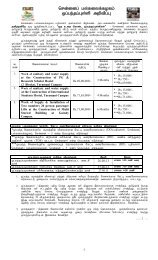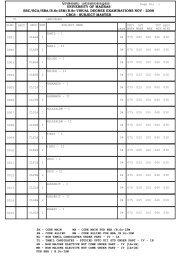Academic Year 2007-2008 - University of Madras
Academic Year 2007-2008 - University of Madras
Academic Year 2007-2008 - University of Madras
Create successful ePaper yourself
Turn your PDF publications into a flip-book with our unique Google optimized e-Paper software.
UNIVERSITY OF MADRAS<br />
Internal Quality Assurance Cell (IQAC)<br />
Chepauk, Chennai 600 005<br />
Annual Quality Assurance Report (AQAR)<br />
<strong>Academic</strong> <strong>Year</strong> <strong>2007</strong>-08<br />
Submitted to<br />
NATIONAL ASSESSMENT AND ACCREDITATION COUNCIL (NAAC)<br />
BANGALORE<br />
1 | P a g e
Contents<br />
Chapter Title Page<br />
1 Pr<strong>of</strong>ile and Governance Structure <strong>of</strong> the <strong>University</strong> 2<br />
2 Internal Quality Assurance Cell: Structure & Activities 7<br />
3 Quality Enhancement 11<br />
4 Section A: Plan <strong>of</strong> Action Proposed and Outcomes Achieved at the 21<br />
End <strong>of</strong> the <strong>Academic</strong> <strong>Year</strong> <strong>2007</strong>-08<br />
5 Section B: Activities <strong>of</strong> the IQAC and <strong>University</strong>’s Achievements 22<br />
6 Section C: Outcome Achieved by the End <strong>of</strong> the <strong>Academic</strong> <strong>Year</strong> 47<br />
<strong>2007</strong>-08<br />
7 Section D: Plans for the Next <strong>Academic</strong> <strong>Year</strong> 48<br />
2 | P a g e
Chapter I:<br />
Pr<strong>of</strong>ile <strong>of</strong> the <strong>University</strong><br />
The <strong>University</strong> <strong>of</strong> <strong>Madras</strong> is one <strong>of</strong> the first three Universities to be established<br />
along with the <strong>University</strong> <strong>of</strong> Bombay (now renamed as <strong>University</strong> <strong>of</strong> Mumbai) and<br />
<strong>University</strong> <strong>of</strong> Calcutta by an Act <strong>of</strong> Parliament in 1857. It is a State <strong>University</strong><br />
governed by the <strong>Madras</strong> <strong>University</strong> Act <strong>of</strong> 1923 <strong>of</strong> the Parliament. The <strong>University</strong> has<br />
celebrated its sesqui-centennial year (150th year) <strong>of</strong> its establishment in 2006-<strong>2007</strong>.<br />
This is an important milestone not merely for the <strong>University</strong> <strong>of</strong> <strong>Madras</strong> but for the<br />
nation as a whole, as the establishment <strong>of</strong> these premier universities in 1857 also marks<br />
the genesis <strong>of</strong> modern India's higher education system.<br />
This renowned institution has distinguished itself by preserving its ancient<br />
heritage and simultaneously forging ahead with the changing times to make its<br />
presence felt in the globally competitive higher education scenario by synergizing<br />
healthy practices with institutional management.<br />
The <strong>University</strong> is proud to have among its alumni, illustrious and eminent<br />
scholars like the mathematics genius Shri Srinivasa Ramanujan, two Nobel Laureates<br />
Sir C.V. Raman, Dr. S. Chandra Sekar, the first Governor-General <strong>of</strong> India, Shri C.<br />
Rajagopalachari, five former Presidents <strong>of</strong> Independent India – Shri Sarvepalli<br />
Radhakrishnan, Shri V. V. Giri, Shri Neelam Sanjev Reddy, Shri R. Venkataraman, Dr.<br />
A.P.J. Abdul Kalam, two former Chief Justices <strong>of</strong> India, Justices K. Subba Rao and M.<br />
Patanjali Sastri and Shri C. Subramaniam, a State and Central Government Minister<br />
and one <strong>of</strong> the three ‘Fathers <strong>of</strong> Green Revolution’.<br />
The <strong>University</strong> <strong>of</strong> <strong>Madras</strong> has been accredited by the NAAC with the celebrated<br />
“five star” accreditation status in September 2000 and reaccredited by the NAAC with<br />
“A” Grade in March <strong>2007</strong>. It has the pride <strong>of</strong> being one <strong>of</strong> the first five Universities to<br />
be conferred with the status <strong>of</strong> <strong>University</strong> with Potential for Excellence by the UGC in<br />
the year 2003.<br />
3 | P a g e
The <strong>University</strong> has 68 teaching and research departments grouped under 18 schools.<br />
The <strong>University</strong> Departments are spread over 6 campuses i.e., Chepauk, Marina, Guindy,<br />
Taramani, Chetpet and Maduravoyal. While the administrative <strong>of</strong>fice and most <strong>of</strong> the<br />
Departments <strong>of</strong> Humanities, Social Sciences and Foreign Languages are located at Chepauk,<br />
the Departments <strong>of</strong> Oriental Languages are housed in the Marina campus. All Basic Science<br />
Departments <strong>of</strong> the <strong>University</strong> function at the Guindy campus and the Departments <strong>of</strong> Basic<br />
Medical Sciences are located at the Taramani campus.<br />
The Ramanujan Institute <strong>of</strong><br />
Mathematics functions from a separate campus in Chepauk. The National Centre for Ultra<br />
Fast Processes and a National Centre for Nano Sciences and Nanotechnology are in the<br />
Taramani and Guindy Campus respectively. The Taramani campus also has a national facility<br />
for a Neuro Chemistry and Technology Business Incubator (TBI) sponsored by DST. The<br />
<strong>University</strong> also has a botanical field laboratory at Maduravoyal and Sports activities are<br />
conducted at the <strong>University</strong> Union Ground at Chetpet that has facilities for track and field<br />
events. The Indoor Stadium at the <strong>University</strong> Union is under renovation.<br />
The <strong>University</strong> <strong>of</strong> <strong>Madras</strong> has 18 departments with the status <strong>of</strong> UGC-SAP and<br />
another 3 are under UGC-CAS (Centre for advanced studies) These Departments are also<br />
receiving grant under UGC ASIST/ASIHSS. 24 departments <strong>of</strong> the <strong>University</strong> <strong>of</strong> <strong>Madras</strong> are<br />
receiving financial support under DST-FIST programme.<br />
The <strong>University</strong> also has an Institute <strong>of</strong> Distance Education (IDE) with an enrollment<br />
<strong>of</strong> 150 thousand, and has 112 affiliated colleges and about 30 research institutions. The<br />
<strong>University</strong> <strong>of</strong> <strong>Madras</strong> is one <strong>of</strong> the few Universities with a large number <strong>of</strong> autonomous<br />
colleges (21). About 130 thousand students are enrolled in the affiliated colleges <strong>of</strong> the<br />
<strong>University</strong> <strong>of</strong> <strong>Madras</strong>.<br />
The <strong>University</strong> <strong>of</strong> <strong>Madras</strong> is a forerunner in introducing innovative courses and<br />
curriculum. The Choice Based Credit System (CBCS) has been followed since 1997. Under<br />
this, the courses and syllabi are revised every year keeping pace with the recent developments<br />
in their respective discipline and new courses including courses on s<strong>of</strong>t skills have been<br />
introduced to enhance the employability <strong>of</strong> the graduates.<br />
4 | P a g e
Many <strong>of</strong> the Departments <strong>of</strong> the <strong>University</strong> <strong>of</strong> <strong>Madras</strong> have been recognized at the<br />
national and international level which is evident from the above facts on the number <strong>of</strong><br />
Departments receiving grants under UGC-CAS/SAP, DST-FIST.<br />
The <strong>University</strong> has statutory bodies such as Senate, Syndicate (Governing Council),<br />
<strong>Academic</strong> Council and other bodies. The <strong>University</strong> strictly adheres to the rules and<br />
regulations pertaining to the State Government’s reservation policy, other policy decisions<br />
and also follows the guidelines <strong>of</strong> the national level organizations such as UGC, AICTE, etc.<br />
1.1 Mission and Vision <strong>of</strong> the <strong>University</strong><br />
Mission <strong>of</strong> the <strong>University</strong><br />
“Our Mission is to impart quality higher education in consonance with our<br />
motto ‘learning promotes natural talent’. We strive to develop citizens with<br />
knowledge, skill and character leading to societal transformation and national<br />
development. We aim at making our students, men and women who <strong>of</strong>fer their<br />
selfless service for the progress <strong>of</strong> the country and people”<br />
Vision on the <strong>University</strong><br />
The <strong>University</strong> <strong>of</strong> <strong>Madras</strong> strives to achieve the following:<br />
i. To contribute to the advancement <strong>of</strong> knowledge through research,<br />
publications and dissemination,<br />
ii.<br />
iii.<br />
iv.<br />
To provide leadership in higher education by imparting quality and<br />
socially relevant knowledge,<br />
To make our education relevant and excellent,<br />
To promote educational programmes in various disciplines <strong>of</strong> knowledge<br />
with synergistic interaction with society and industry,<br />
v. To develop aptitude and skills <strong>of</strong> students to equip them to face the<br />
challenges and needs <strong>of</strong> a fast changing society,<br />
vi.<br />
vii.<br />
viii.<br />
To give greater opportunity to women and other weaker and socioeconomically<br />
backward sections <strong>of</strong> the society in order to prepare them to<br />
be effective leaders,<br />
To make students conscious <strong>of</strong> their duty to the country and fellow human<br />
beings,<br />
To inculcate values <strong>of</strong> equality, unity and justice.<br />
5 | P a g e
1.2 Governance and <strong>University</strong> Authorities<br />
CHANCELLOR<br />
His Excellency Thiru SURJIT SINGH BARNALA<br />
Governor <strong>of</strong> Tamil Nadu<br />
Chancellor <strong>of</strong> the <strong>University</strong><br />
Raj Bhavan, Guindy, Chennai 600 022.<br />
PRO-CHANCELLOR<br />
Dr K. PONMUDY, Ph.D.,<br />
Honourable Minister for Higher & Technical Education,<br />
Government <strong>of</strong> Tamil Nadu<br />
Pr<strong>of</strong>-Chancellor <strong>of</strong> the <strong>University</strong> <strong>of</strong> <strong>Madras</strong><br />
Fort St. George, Secretariat, Chennai 600 009<br />
VICE-CHANCELLOR<br />
Dr S. RAMACHANDRAN M.Sc., Ph.D.[India], Ph.D.[USA], D.Sc.,<br />
Vice-Chancellor<br />
<strong>University</strong> <strong>of</strong> <strong>Madras</strong><br />
Chepauk, Chennai 600 005<br />
REGISTRAR<br />
Dr M. RANGANATHAM, M.Com., Ph.D.,<br />
Registrar-in-charge<br />
<strong>University</strong> <strong>of</strong> <strong>Madras</strong><br />
Chepauk, Chennai 600 005<br />
THE SENATE<br />
The Senate is the supreme authority <strong>of</strong> the <strong>University</strong>. The Senate met four times<br />
during <strong>2007</strong>-<strong>2008</strong>. (i) An Ordinary meeting was held on 27th October <strong>2007</strong>. On the same<br />
day, at a Special Meeting, the titles and diplomas were conferred to successful candidates, (ii)<br />
A Special Meeting <strong>of</strong> the Senate was held on 10th November <strong>2007</strong> to confer Degree <strong>of</strong><br />
Honoris Causa for Ten Personalities <strong>of</strong> Eminence. (iii) The Annual Meeting <strong>of</strong> the Senate<br />
was held on 29th March <strong>2008</strong>. (iv) The Special Meeting <strong>of</strong> the Senate was held on 21st June<br />
<strong>2008</strong> for the introduction <strong>of</strong> New Choice Based Credit Systems Regulations.<br />
6 | P a g e
THE SYNDICATE<br />
The Syndicate, the executive authority <strong>of</strong> the <strong>University</strong> met ten times during the year<br />
as follows: 13-07-<strong>2007</strong>, 20-08-<strong>2007</strong>, 14-09-<strong>2007</strong>, 19-10-<strong>2007</strong>, 07-12-<strong>2007</strong>, 11-01-<strong>2008</strong>, 11-<br />
02-<strong>2008</strong>, 07-03-<strong>2008</strong>, 26-04-<strong>2008</strong>, 13-06-<strong>2008</strong> and met for Special Syndicate on 10-11-<strong>2007</strong><br />
for Honaris Causa, in addition, the 11 items were considered by placing the matters to the<br />
Syndicate-in-Circulation.<br />
THE ACADEMIC COUNCIL<br />
The <strong>Academic</strong> Council met three times during <strong>2007</strong>-<strong>2008</strong>. The first meeting was held<br />
on 29th September <strong>2007</strong>, the second on 29th March <strong>2008</strong> and the third on 20th June <strong>2008</strong>.<br />
FACULTIES & SCHOOLS<br />
During <strong>2007</strong>-<strong>2008</strong> there were the Faculties <strong>of</strong> Arts, Science, Law, Medicine,<br />
Engineering Technology, Education/Teaching, Commerce, Indian and other Languages, Fine<br />
Arts and Management Sciences. The Teaching and Research Departments <strong>of</strong> the <strong>University</strong><br />
<strong>of</strong> <strong>Madras</strong> are grouped into 18 Schools.<br />
BOARDS OF STUDIES<br />
The School Committee is the Board <strong>of</strong> Studies for the <strong>University</strong> Departments. The<br />
School Committee meets at least twice a year and as and when required for the constituent<br />
departments to meet and discuss matters relating to courses, curriculum and syllabus. There<br />
is a separate Board <strong>of</strong> Studies (BoS) for affiliated non-autonomous colleges and the total<br />
number <strong>of</strong> such Board <strong>of</strong> Studies as on 30th June <strong>2008</strong> was 90. The BoS meets as and when<br />
required to make decisions on matters relating to courses <strong>of</strong>fered in affiliated colleges.<br />
STANDING COMMITTEE OF THE ACADEMIC COUNCIL<br />
The Standing Committee <strong>of</strong> the <strong>Academic</strong> Council met twice in the year. The first<br />
meeting was held during August <strong>2007</strong> and the second on January <strong>2008</strong>.<br />
7 | P a g e
Chapter 2<br />
International Quality Assurance Cell (IQAC)<br />
A major requirement <strong>of</strong> the accreditation process implemented by the National<br />
Assessment and Accreditation Council (NAAC) <strong>of</strong> the <strong>University</strong> Grants Commission is that<br />
institutions <strong>of</strong> higher education should create an internal quality assurance and audit cell, and<br />
develop and implement a mechanism for continuous quality assessment and academic audit.<br />
The <strong>University</strong> <strong>of</strong> <strong>Madras</strong>, following its accreditation in 2000 by NAAC at 5-star level, set<br />
up the Internal Quality Assurance Cell (IQAC) and <strong>Academic</strong> Audit committee to formulate<br />
broad guidelines and develop a template to obtain information / data from the university<br />
departments as well as affiliated institutions (colleges and research institutes) to facilitate<br />
quality assessment.<br />
It is also mandatory for all NAAC accredited institutions to establish an IQAC to<br />
assess and monitor the performance <strong>of</strong> the respective institution on a continuous basis. The<br />
IQAC is meant for planning, guiding and monitoring Quality Assurance (QA) and Quality<br />
Enhancement (QE) activities <strong>of</strong> the <strong>University</strong>. participative organ <strong>of</strong> the institution. The<br />
IQAC aims to enhance the quality by working out intervention strategies to remove<br />
deficiencies.<br />
The IQAC has been effectively functioning since its accreditation [First Cycle] in<br />
2000 and also after the Re-accreditation in March <strong>2007</strong> [2 nd Cycle]. The Advisory<br />
Committee <strong>of</strong> the IQAC, has been constituted as per NAAC Guidelines [XI Plan Guidelines<br />
for Establishment and Monitoring <strong>of</strong> the Internal Quality Assurance Cells (IQACs) in Higher<br />
Educational Institutions (HEIs) (<strong>2007</strong>-2012), UGC <strong>2007</strong>, www.ugc.ac.in]. The Advisory<br />
Committee for <strong>2007</strong>-08 is given below:<br />
8 | P a g e
UNIVERSITY OF MADRAS<br />
Internal Quality Assurance Cell (IQAC)<br />
Advisory Committee<br />
<strong>Academic</strong> <strong>Year</strong> <strong>2007</strong> - <strong>2008</strong><br />
CHAIRPERSON<br />
EX-OFFICIO<br />
ADMINISTRATIVE<br />
OFFICER<br />
MEMBER SECRETARY<br />
SENIOR<br />
MEMBERS<br />
EX-OFFICIO<br />
EXTERNAL EXPERTS<br />
Dr.S.Ramachandran<br />
Vice Chancellor<br />
Dr. M. Ranganatham<br />
Registrar i/c<br />
Dr. P. Duraisamy<br />
Pr<strong>of</strong>essor and Head, Department <strong>of</strong><br />
Econometrics, <strong>University</strong> <strong>of</strong> <strong>Madras</strong><br />
Dr Parimama<br />
Dean, College Development Council<br />
Dr D.Velmurugan<br />
Pr<strong>of</strong>essor and Head, Crystallography and<br />
Biophysics, <strong>University</strong> <strong>of</strong> <strong>Madras</strong><br />
Pr<strong>of</strong> P.T.Srinivasan<br />
Pr<strong>of</strong>essor, Department <strong>of</strong> Management<br />
studies<br />
Pr<strong>of</strong> S.T.Sathiya<br />
Pr<strong>of</strong>essor, Department <strong>of</strong> Genetics<br />
Pr<strong>of</strong> S.Sriman Narayanan<br />
Pr<strong>of</strong>essor, Department <strong>of</strong> Analytical<br />
Chemistry<br />
Pr<strong>of</strong> Siniruddha Dash<br />
Pr<strong>of</strong>essor and Head, Department <strong>of</strong><br />
Sanskrit<br />
Pr<strong>of</strong> G.Srinivasan<br />
Department <strong>of</strong> Management studies<br />
IIT, Chennai<br />
9 | P a g e
1.3 Goals <strong>of</strong> the IQAC<br />
The goals <strong>of</strong> the IQAC as per the UGC Guidelines are set as:<br />
i. To develop a quality system for conscious, consistent and catalytic programmed<br />
action to improve the academic and administrative performance <strong>of</strong> the HEIs;<br />
ii. To promote measures for institutional functioning towards quality enhancement<br />
through internalization <strong>of</strong> quality culture and institutionalization <strong>of</strong> best practices.<br />
1.4 Functions <strong>of</strong> the IQAC<br />
The functions <strong>of</strong> the IQAC have been set as per the UGC Guidelines which are given below:<br />
· Development and application <strong>of</strong> quality benchmarks/parameters for the various<br />
academic and administrative activities <strong>of</strong> the <strong>University</strong>;<br />
· Facilitating the creation <strong>of</strong> a learner-centric environment conducive for quality<br />
education and faculty maturation to adopt the required knowledge and technology for<br />
participatory teaching and learning process;<br />
· Arrangement for feedback responses from students, parents and other stakeholders on<br />
quality-related institutional processes;<br />
· Dissemination <strong>of</strong> information on the various quality parameters <strong>of</strong> higher education;<br />
· Organization <strong>of</strong> inter and intra institutional workshops, seminars on quality related<br />
themes and promotion <strong>of</strong> quality circles;<br />
· Documentation <strong>of</strong> the various programmes/activities <strong>of</strong> the <strong>University</strong>, leading to<br />
quality improvement;<br />
· Acting as a nodal agency <strong>of</strong> the <strong>University</strong> for coordinating quality-related activities,<br />
including adoption and dissemination <strong>of</strong> good practices;<br />
· Development and maintenance <strong>of</strong> Institutional database through MIS for the purpose<br />
<strong>of</strong> maintaining /enhancing the institutional quality;<br />
· Development <strong>of</strong> Quality Culture in <strong>University</strong>;<br />
· Preparation <strong>of</strong> the Annual Quality Assurance Report (AQAR) <strong>of</strong> the <strong>University</strong> based<br />
on the quality parameters/assessment criteria developed by the relevant quality<br />
assurance body (like NAAC, NBA, AB) in the prescribed format;<br />
· Bi-annual development <strong>of</strong> Quality Radars (QRs) and Ranking <strong>of</strong> Integral Units <strong>of</strong> the<br />
<strong>University</strong> based on the AQAR;<br />
· Interaction with SQACs in the pre and post accreditation quality assessment,<br />
sustenance and enhancement endeavours.<br />
10 | P a g e
1.5. Activities <strong>of</strong> the IQAC<br />
The IQAC <strong>of</strong> the <strong>University</strong> <strong>of</strong> <strong>Madras</strong> has undertaken the following activities for<br />
continuous measurement <strong>of</strong> quality and also to facilitate and bring about improvement:<br />
(i)<br />
(ii)<br />
(iii)<br />
(iv)<br />
Obtaining and Analysing Student’s Feedback <strong>of</strong> the CBCS courses and<br />
teacher evaluation<br />
Eliciting Self-Appraisal Report from Faculty Members<br />
Conducting <strong>Academic</strong> Audit <strong>of</strong> the CBCS<br />
Preparing the IQAC report based on the Quality enhancement activities <strong>of</strong> the<br />
<strong>University</strong> Departments.<br />
The IQAC <strong>of</strong> the <strong>University</strong> provides guidance and support to undertake quality<br />
assessment and improvement activities in the affiliated institutions and these institutions are<br />
requested to submit a copy <strong>of</strong> the IQAC annual report to the <strong>University</strong>.<br />
Students Feedback<br />
The Student Feedback forms received from 45 Departments in respect <strong>of</strong> the teachers<br />
handling various courses were analysed and scores awarded. The scores awarded to 169<br />
teachers by analysing the 3685 forms were placed before the Syndicate and got approved.<br />
[A detailed report on the Students Feedback and the scores are available in the IQAC]<br />
11 | P a g e
Chapter 3:<br />
<strong>University</strong> Activities towards Quality<br />
Sustenance and Quality Enhancement<br />
3.1 Programmes Conducted by <strong>Academic</strong> Staff College<br />
· The UGC - <strong>Academic</strong> Staff College, <strong>University</strong> <strong>of</strong> <strong>Madras</strong> has conducted 5<br />
Orientation Programmes and 14 Refresher Courses in different disciplines. Besides,<br />
the ASC –UOM has conducted 3 short-term courses/workshops/training programmes<br />
for Senior Faculty Members, Programmes for Researchers to Prepare Research<br />
Projects, Programmes for Research Guides in Social Sciences, Humanities and<br />
Sciences.<br />
· Approximately 166 Resource Persons for Orientation Courses and 434 Resource<br />
Persons for Refresher Courses were invited during the year <strong>2007</strong>-<strong>2008</strong>.<br />
· A follow-up study on the Post-Training Effectiveness was conducted among the<br />
Teacher- Participants who attended the Orientation Course / Refresher Course during<br />
the financial year 2006-<strong>2007</strong>. The study brought out useful information which could<br />
be adopted in the forthcoming programmes with better efficacy and excellence.<br />
· 724 Teachers Participants <strong>of</strong> Orientation Course and 1775 Teachers Participants <strong>of</strong><br />
Refresher Courses were trained for Computer literacy.<br />
· Two-day workshop on “Quality Circles” for Administrative Staff members <strong>of</strong><br />
<strong>University</strong> <strong>of</strong> <strong>Madras</strong> ( Senior Deputy Registrar / Deputy Registrar / Assistant<br />
Registrar /Section Officer) from 09.07.<strong>2007</strong> to 19.07.<strong>2007</strong> in Four batches were<br />
conducted and 168 Educational Administrators were sensitized on the formats <strong>of</strong><br />
Quality Circles.<br />
· UGC-<strong>Academic</strong> Staff College, <strong>University</strong> <strong>of</strong> <strong>Madras</strong> for the first time brought out the<br />
study/Reading Materials in the form <strong>of</strong> CD. As <strong>of</strong> date 57 Series <strong>of</strong> C.D. in various<br />
disciplines were released for the benefit <strong>of</strong> the Teaching Community.<br />
· Two-day workshop for the Principals on “S<strong>of</strong>t Skill Development” was conducted on<br />
20th & 21st September <strong>2007</strong>. 62 College Principals <strong>of</strong> affiliated Colleges were<br />
motivated to develop s<strong>of</strong>t skill among students and create employability<br />
· One day workshop for Principals & Chairman, Board <strong>of</strong> Studies <strong>of</strong> UG Board on<br />
“S<strong>of</strong>t Skill Development” was conducted on 30.11.<strong>2007</strong>. 75 College Principals <strong>of</strong><br />
affiliated Colleges and Chairman <strong>of</strong> Board <strong>of</strong> studies (UG Board) were motivated to<br />
develop s<strong>of</strong>t skill among students and create employability.<br />
12 | P a g e
· Besides, the UGC - <strong>Academic</strong> Staff College <strong>of</strong> the <strong>University</strong> <strong>of</strong> <strong>Madras</strong> in<br />
collaboration with Tamil Nadu State Council for Higher Education, Chennai – 5<br />
conducted Orientation Programme (Intensive Training) for newly recruited<br />
Government College Lecturers from 26th December <strong>2007</strong> to 24th January <strong>2008</strong><br />
which benefitted 269 College Teachers. It was the first time that such a programme<br />
was organized in the State <strong>of</strong> Tamil Nadu.<br />
· In accordance with the UGC letter D.O. No. F-24-1/<strong>2008</strong> (Misc/ASC), dated<br />
21.06.<strong>2008</strong> and with the approval <strong>of</strong> the Vice-Chancellor, <strong>University</strong> <strong>of</strong> <strong>Madras</strong>, the<br />
UGC-<strong>Academic</strong> Staff College, <strong>University</strong> <strong>of</strong> <strong>Madras</strong> conducted a Special Summer<br />
School – <strong>2008</strong> programme on the theme <strong>of</strong> “S<strong>of</strong>t Skills & Personality Development “<br />
between 23.07.<strong>2008</strong> and 12.08.<strong>2008</strong>. 52 College Teacher – Participants benefited<br />
from the above mentioned Refresher Course.<br />
· The UGC-<strong>Academic</strong> Staff College, <strong>University</strong> <strong>of</strong> <strong>Madras</strong> imparted Induction & E-<br />
Governance Training for the newly recruited Assistants between 04.08.<strong>2008</strong> and<br />
14.08.<strong>2008</strong> (10 days). 22 newly recruited Assistants were trained through the<br />
programme.<br />
3.2 <strong>University</strong> Industry Community Interaction Centre (UICIC)<br />
· 6 P.G Diploma/ Diploma/ Certificate courses were conducted through UICIC during<br />
the academic year with 63 participants.<br />
· UCICI also encourages faculty members to undertake consultancy projects and<br />
university-industry collaboration.<br />
3.3 UGC Scheme “<strong>University</strong> with Potential for Excellence”<br />
· The <strong>University</strong> <strong>of</strong> <strong>Madras</strong> has been progressing well towards the original theme <strong>of</strong><br />
the programme approved by the UGC in 2001 under a focused area <strong>of</strong> Herbal Science<br />
and a broad area <strong>of</strong> Holistic Development Programme identified by UGC, and<br />
implemented since 2003 as the first phase <strong>of</strong> activity.<br />
· To synchronize the current knowledge and international expectations in the area <strong>of</strong><br />
Herbal Sciences with the academic strengths and research outputs <strong>of</strong> <strong>University</strong> <strong>of</strong><br />
<strong>Madras</strong>.<br />
· To envisage a holistic approach on the study <strong>of</strong> herbal plants <strong>of</strong> terrestrial, marine<br />
and high altitude habitat through a multifaceted methodology – matrix <strong>of</strong> science,<br />
13 | P a g e
technology, medicine, documentation, literature and industry with the sole objective<br />
<strong>of</strong> upholding Indian culture and economy.<br />
· To synergise higher education, applied research and, industry partnership with the<br />
ultimate aim <strong>of</strong> evolving the <strong>University</strong> <strong>of</strong> <strong>Madras</strong> as an “International Centre <strong>of</strong><br />
Excellence in Herbal Sciences”. A total <strong>of</strong> 51 research projects on various aspects <strong>of</strong><br />
research viz. Screening for plants for medicinal, insecticidal and aquaculture<br />
application, isolation and characterization <strong>of</strong> potent biomolecules testing and<br />
validation were pursued by involving 51 faculty members drawn from 21<br />
departments belonging to 8 Schools <strong>of</strong> the <strong>University</strong> under the Herbal Sciences and<br />
the holistic developmental activities, involving three identified thrust areas <strong>of</strong><br />
research namely (i) Biomedical Sciences (ii) New Materials and (iii) Revision <strong>of</strong><br />
Tamil Lexicon.<br />
· Creation <strong>of</strong> a modern multilingual dictionary and improvement <strong>of</strong> infrastructural<br />
facilities by means <strong>of</strong> creation <strong>of</strong> a sophisticated instrumentation facility at Guindy<br />
and Taramani Campuses. apart from construction <strong>of</strong> new buildings such as<br />
International Guest House, Additional Class rooms, Students Amenity Centres,<br />
Women’s hostel and an Inspector for testing insecticidal properties <strong>of</strong> herbal and<br />
chemical molecules.<br />
· Modernization <strong>of</strong> libraries, networking <strong>of</strong> all campuses and libraries also formed a<br />
part <strong>of</strong> the holistic development programme.<br />
3.4 Enhancing Learning Resources: Main Library<br />
· The <strong>University</strong> Library is kept open from 8.00 A.M. to 8.00 P.M. on all days <strong>of</strong> the<br />
year including public holidays.<br />
· Touch Screen Information facility has been provided in our library to educate the<br />
members about library organization, activities and services.<br />
· Departmental Library at Annex Building is kept open 10 A.M. to 5-45 P.M. on all<br />
working days.<br />
· A resource cell for Competitive Examinations has been established to cater to the<br />
needs <strong>of</strong> the users appearing for various competitive examinations conducted by<br />
different organizations and institutions. A total collection <strong>of</strong> 3500 books are available<br />
for the use <strong>of</strong> readers.<br />
14 | P a g e
· A closed Access Stack <strong>of</strong> Books published before 1960 has been organized<br />
separately. Books are arranged in classified order and barcoded. A proposal for<br />
creation <strong>of</strong> a separate database for classic collection has been initiated.<br />
· The Central Library <strong>of</strong> Dr. ALM Post Graduate Institute <strong>of</strong> Basic Medical Sciences<br />
provides best services and facilities like Electronic Resource Centre, Web Portal,<br />
OPAC, INTRANET, INTERNET etc. through Online Information Zone for Faculties<br />
/ Research Scholars / Students <strong>of</strong> our Institute in addition to the Library routine<br />
services. This Library also provides services to the members from affiliated<br />
colleges/Institutions and Industries. The Library functions from 9a.m to 6 p.m<br />
Monday to Friday and from 10 a.m to 4 p.m during weekends.<br />
· MALIBNET and IIT Cards were issued to Research scholars and PG students for<br />
their reference work through the Institutional membership.<br />
3.5 Service to Affiliated Colleges: College Development Council<br />
· The College Development Council is functioning to help all the affiliated colleges <strong>of</strong><br />
the <strong>University</strong> <strong>of</strong> <strong>Madras</strong>. Out <strong>of</strong> the 181 affiliated colleges, 44 colleges are coming<br />
under Section 2(f) and 12(B) <strong>of</strong> UGC Act. Out <strong>of</strong> these 44 colleges, 15 are<br />
Government Colleges, 28 are Aided Colleges and one is a Self-Financing College.<br />
By enabling these colleges under the said sections <strong>of</strong> the UGC Act, they are<br />
facilitated to get UGC’s financial assistance under different Schemes.<br />
3.6 Service to Students: <strong>University</strong> Students Advisory Bureau<br />
· Guidance and Counselling: Around 50 students approached USAB for counselling<br />
and vocational guidance. The students were guided on higher education in Indian<br />
Universities and abroad. USAB has all reference books pertaining to them.<br />
· Short-term Job-oriented Courses: The USAB runs short-term job-oriented courses<br />
for the graduates. When the courses are not supported by Government Agencies they<br />
are organized on Self- Funding basis<br />
· USAB Computer Training: The USAB runs a computer training lab under the<br />
auspices <strong>of</strong> the <strong>University</strong> Industry Consultancy. The revenue received from the<br />
courses is shared in the proportion <strong>of</strong> 20% to the university and 80% for running the<br />
courses. The 18 different courses taught through the lab are: Office Enablers, PP to<br />
IT, Computer Accounting Package, VB & Oracle, C, C++, Linux and Basic,<br />
Networking Administration, 2D and 3D Animation, Graphic Designing & Editing,<br />
15 | P a g e
Desktop Publishing (DTP), C, C++, and Java, DTP, Web Developer, Linear-Non<br />
Linear, E-commerce solutions. About 50 students were enrolled in the course from<br />
July <strong>2007</strong> to June <strong>2008</strong><br />
· Science Talent Promotion Scheme: The USAB organises “Science Talent<br />
Promotion Scheme’ every year (May and June) for the First year Post Graduate<br />
students studying in the <strong>University</strong> Departments. The USAB placed 42 Students in the<br />
Industries/National Laboratories and Banks for Internship Training and during the<br />
training period they were paid the stipend.<br />
· Placement: The USAB registers graduates for jobs. Local Private Companies and<br />
Government organizations looking for candidates for temporary vacancies approach<br />
the USAB for candidates. About 750 candidates were placed during July <strong>2007</strong> to June<br />
<strong>2008</strong> in the <strong>University</strong> Departments/Sections and the Government and Private sector<br />
organizations in the city for various temporary/permanent jobs.<br />
· Annual Sports Event: The USAB conducted Annual Sports Event with the help <strong>of</strong><br />
Dean (Students), Physical Director, NSS-Coordinator, Programme Officer, and PG<br />
Unit for the PG and Research students <strong>of</strong> various academic Departments in the<br />
<strong>University</strong> <strong>of</strong> <strong>Madras</strong>. Thus, the USAB organizes many Students Welfare<br />
Programmes for the benefit <strong>of</strong> the current students as well as for those who have<br />
passed out <strong>of</strong> this <strong>University</strong>.<br />
· <strong>Madras</strong> <strong>University</strong> Education Exhibition – <strong>2008</strong>: It was suggested by our Vice-<br />
Chancellor to conduct an exhibition to highlight the courses <strong>of</strong>fered in the <strong>University</strong><br />
area to benefit the +2 students, who are about to enter the colleges. It was for the first<br />
time in the History <strong>of</strong> the <strong>University</strong> <strong>of</strong> <strong>Madras</strong> that the concept <strong>of</strong> Education<br />
Exhibition was conceived and implemented.<br />
3.7 National Service Scheme<br />
The NSS Cell, <strong>University</strong> <strong>of</strong> <strong>Madras</strong> and Coca Cola India had jointly organized tree<br />
plantation at Marina on eve <strong>of</strong> World Environment day on 5.6.<strong>2007</strong>. The NSS Cell, university<br />
<strong>of</strong> <strong>Madras</strong> and Department <strong>of</strong> Psychology <strong>University</strong> <strong>of</strong> <strong>Madras</strong> had Jointly Organized One<br />
Day Free Career Counseling and Guidance & Training Programme for 10th 12th<br />
unsuccessful students with their parents. About 400 NSS Volunteers Participated in the above<br />
Camp.<br />
16 | P a g e
3.8 International Centre <strong>of</strong> the <strong>Madras</strong> <strong>University</strong> (ICOM)<br />
· Promoting international exchange through MOU<br />
· Coordinating visits <strong>of</strong> delegations from abroad<br />
· Coordinating student exchange to and from UNOM<br />
· Publicizing scholarships, helping students obtain aid and administering the corpus<br />
fund <strong>of</strong> UNOM<br />
· Facilitating researchers from abroad to work for limited period under casual research<br />
· Promoting Joint/Dual PG Degree and Joint Ph.D. programmes with Universities<br />
abroad<br />
· Providing credit transfer facilities at the graduate and post graduate levels.<br />
· Helping design short term, need-based courses for overseas students<br />
3.9 Medical Care Centre<br />
· The <strong>University</strong> <strong>of</strong> <strong>Madras</strong>, Medical Centre functions in a new premise in the Library<br />
Annexure Complex. The Employees (both Teaching & Non-Teaching staff) <strong>of</strong> the<br />
<strong>University</strong> <strong>of</strong> <strong>Madras</strong> utilises the services <strong>of</strong> the Medical Centre for various ailments<br />
like Diabetes, Hypertension, Heart Disease, Fever and other Medical Emergencies.<br />
The Medical Centre provides medications to the employees for various diseases, and<br />
is being managed by a Senior Physician.<br />
3.10 Special Cell for the Welfare <strong>of</strong> Scheduled Castes and Scheduled Tribes<br />
· The Special Cell for the Welfare <strong>of</strong> Scheduled Castes and Scheduled Tribes was set<br />
up in the <strong>University</strong> as per the suggestion <strong>of</strong> the <strong>University</strong> Grants Commission on<br />
17.7.1985.<br />
· The Statistical cell, part <strong>of</strong> the SC/ST special cell is also dealing with the statistical<br />
information with regards to the <strong>University</strong> Teaching Departments as well as affiliated<br />
colleges <strong>of</strong> this <strong>University</strong>.<br />
· A Standing Committee <strong>of</strong> the SC/ST Special Cell with the Vice –Chancellor as<br />
Chairman, Convened the meeting twice a year to monitor the progress <strong>of</strong> the<br />
implementation <strong>of</strong> reservation policy <strong>of</strong> the State Government, Problems relating to<br />
the tuition fee Concession special /loan scholarship, Post-Matric Scholarship, etc.,<br />
thus facilitating the student <strong>of</strong> these communities to concentrate on their Studies.<br />
17 | P a g e
3.11 Major International/ National/ Regional Seminars organised for Quality<br />
Sustenance and Quality Enhancement, <strong>Academic</strong> <strong>Year</strong> <strong>2007</strong> – <strong>2008</strong><br />
National<br />
Sl.<br />
no Department Seminars<br />
/Interna<br />
tional<br />
SCHOOL OF HISTORICAL STUDIES<br />
1 Indian History Human Rights and Dalits Issues and Strategies National<br />
Composite Tamil Nadu: A Study in Cultural<br />
Pluralism<br />
National<br />
2<br />
SCHOOL OF SOCIAL SCIENCES<br />
Adult and<br />
Continuing<br />
Education<br />
3 Criminology<br />
4<br />
Department <strong>of</strong><br />
Education<br />
Orientation for <strong>University</strong> / College Teachers &<br />
NGO’s on protection <strong>of</strong> Women from Domestic<br />
Violence in collaboration with the Department <strong>of</strong><br />
Legal Studies <strong>University</strong> <strong>of</strong> <strong>Madras</strong><br />
UGC course on Research Methodology for Research<br />
Scholar <strong>of</strong> <strong>Madras</strong> <strong>University</strong><br />
“World Literary Day “ the collaboration with Jan<br />
Sholsja Sansthan Chennai at Tiruvotriyur outpost <strong>of</strong><br />
JSS. More than 100 women participated.<br />
Awareness programme on Health/Legal issues for<br />
women in collaboration work FPAI Chennai Branch.<br />
National<br />
National<br />
National<br />
More than 50 women participated<br />
National<br />
Organized a one day workshop on “Working <strong>of</strong> the<br />
Union Public Service Commission” on 31st March<br />
<strong>2008</strong> at the <strong>University</strong> <strong>of</strong> <strong>Madras</strong>, Chennai 600 005. National<br />
Organized a seminar on “Social Engineering” at the<br />
Department <strong>of</strong> Criminology, <strong>University</strong> <strong>of</strong> <strong>Madras</strong>.<br />
The lecture was delivered by Mr. Jim Mcconnell,<br />
Vice – President, Information Security, Verizon<br />
Technologies Pvt Ltd on 7 th April <strong>2008</strong>.<br />
Seminar on Money Laundering andDrugs<br />
Conducted a National Seminar on “Towards<br />
Excellence in Special Education in 21 st Century”<br />
Conducted a Refresher Course in Educational<br />
Technology titled “Technology Integration in Higher<br />
Education”, Batch-VI[05.02.<strong>2008</strong> to 25.02.<strong>2008</strong>]<br />
Orientation (Intensive Training) Programme for the<br />
Newly recruited Teachers for Government Colleges<br />
conducted by TANSCHE[26.12.<strong>2007</strong> to 24.01.<strong>2008</strong>]<br />
National<br />
National<br />
National<br />
National<br />
National<br />
5 Psychology Psychology for promoting corporate Excellence National<br />
6 Sociology<br />
Sociology <strong>of</strong> Health: Institutions, Knowledge and<br />
Practices in India<br />
National<br />
Rural Communities: Problems and Challenges<br />
Inter<br />
National<br />
Sociology in Tamil Nadu: Institutions and Practices<br />
National<br />
18 | P a g e
SCHOOL OF POLITICAL AND INTERNATIONAL STUDIES<br />
7<br />
Anna Centre for<br />
Public Affairs 15th National Children Science Congress National<br />
Public Affairs and Governance: Challenges and<br />
Strategies<br />
Inter<br />
National<br />
8<br />
Defense &<br />
Strategic Studies Internal Security Dimensions <strong>of</strong> India National<br />
9 Legal Studies<br />
National Seminar on information and<br />
Communication laws<br />
National<br />
National Seminar on Judges Enquiry Bill – 18, 19, National<br />
10<br />
11<br />
Politics and Public<br />
Administration<br />
Environment and Health: Challenges and Responses<br />
in South India<br />
National<br />
SCHOOL OF ECONOMICS<br />
Dr. Ambedkar<br />
Centre for<br />
Economic Studies Manual & Dates <strong>of</strong> the Conference/Seminar National<br />
12 Economics<br />
Ambedkar and Buddhism(Seminar)<br />
National<br />
Dr.R. Arunachalam, Pr<strong>of</strong>essor August<br />
<strong>2007</strong>, Agricultural Growth India National<br />
13 Econometrics<br />
Economic Growth, Poverty and Human<br />
Development<br />
Restructuring UG Courses and Curriculum -Meeting<br />
<strong>of</strong> Chairpersons <strong>of</strong> all UG Board <strong>of</strong> Studies and<br />
Principals <strong>of</strong> the affiliated non-autonomous colleges<br />
<strong>of</strong>fering UG programmes<br />
Organized in collaboration with other Deans the<br />
‘Students Day’ function<br />
Orientation for Faculty Development programme for<br />
the Courses on S<strong>of</strong>t skills<br />
SCHOOL OF INFORMATION AND COMMUNICATION STUDIES<br />
Library &<br />
Information National Seminar on Information Literacy & Higher<br />
14 Science<br />
Education<br />
SCHOOL OF PHILOSOPHY AND RELIGIOUS THOUGHT<br />
15 Christian Studies India–China Cultural Dialogue<br />
Changing Power Equations: A Gender Perspective<br />
The Role <strong>of</strong> Spiritual Beliefs and Practices in Post-<br />
Diagnosis Care <strong>of</strong> HIV/AIDS Women<br />
16 Philosophy<br />
Theology with Asian Cultural Resources<br />
The Developments in Indian Philosophy from the<br />
Eighteenth Century onwards<br />
Modern Philosophical Movements in the Tamil<br />
Tradition<br />
National<br />
National<br />
National<br />
National<br />
National<br />
Internati<br />
onal<br />
National<br />
National<br />
National<br />
National<br />
Regional<br />
17 Vaishnavism Alagiya Perumal NayanarSeminar National<br />
19 | P a g e
SCHOOL OF FINE AND PERFORMING ARTS<br />
18 Indian Music Platinum Jubilee <strong>Year</strong> <strong>of</strong> the Dept.Of Indian Music National<br />
International Music Festival<br />
Internati<br />
onal<br />
Areas <strong>of</strong> research in Music and Research<br />
Methodology<br />
National<br />
SCHOOL OF ENGLISH AND FOREIGN LANGUAGES<br />
Department <strong>of</strong><br />
19 English Dalit Writers Meeting National<br />
Literary and Culture Studies<br />
National<br />
The Contribution <strong>of</strong> the Bhakti Movement and<br />
Literature to World Culture<br />
National<br />
SCHOOL OF TAMIL AND OTHER DRAVIDIAN LANGUAGES<br />
Department <strong>of</strong><br />
20 Telugu Telugu Cine Literature & Language National<br />
21<br />
Department <strong>of</strong><br />
Kannada K.P.Poornachandra Tejaswi’s Literature National<br />
22<br />
23<br />
24<br />
25<br />
26<br />
27<br />
28<br />
29<br />
30<br />
Department <strong>of</strong><br />
Malayalam Malayalam Grammar: A Review and Revisit National<br />
GREEN THEORY – IDEOLOGY AND<br />
PERCEPTION<br />
National<br />
SCHOOL OF SANSKRIT AND OTHER INDIAN LANGUAGES<br />
Department <strong>of</strong><br />
Arabic, Persian and<br />
Urdu Modern Arabic Literature <strong>of</strong> Saudi Arabia National<br />
Department <strong>of</strong><br />
Internati<br />
Hindi<br />
Society Depicted in the Modern Hindi Literature onal<br />
Department <strong>of</strong><br />
Sanskrit Refresher course on Sanskrit and other languages National<br />
Influence <strong>of</strong> Sanskrit and English vice-versa National<br />
SCHOOL OF BUSINESS AND MANAGEMENT<br />
Department <strong>of</strong><br />
Commerce Retail marketing National<br />
Department <strong>of</strong><br />
Management<br />
Studies HR Fusion National<br />
SCHOOL OF MATHEMATICS, STATISTICS AND COMPUTER SCIENCE<br />
Ramanujan<br />
Institute for<br />
Advanced Study in 15th Ramanujan Symposium on<br />
Mathematics Dynamic Equations at RIASM<br />
National<br />
SCHOOL OF EARTH AND ATMOSPHERIC SCIENCES<br />
V International Congress & International Conference<br />
Department <strong>of</strong> on Environmental Micropaleontology, Microbiology Internati<br />
Applied Geology & Meiobenthology<br />
onal<br />
Department <strong>of</strong><br />
Geography National Seminar on Geoinformatics National<br />
20 | P a g e
31<br />
32<br />
33<br />
34<br />
35<br />
SCHOOL OF CHEMICAL SCIENCES<br />
Department <strong>of</strong><br />
Physical Chemistry New Vistas in Physical Chemistry National<br />
SCHOOL OF PHYSICAL SCIENCES<br />
Department <strong>of</strong><br />
CAS in<br />
Crystallography & Recent Trends in Macromolecular Structure and Internati<br />
Biophysics Function<br />
onal<br />
Department <strong>of</strong><br />
Nuclear Physics X-Ray diffraction facility National<br />
SCHOOL OF LIFE SCIENCES<br />
Department <strong>of</strong> Computational Drug Discovery in Pharma R&D”, by Internati<br />
Biotechnology Bioinformatics Infrastructure facility (BIF)<br />
onal<br />
Centre for<br />
Advanced Studies<br />
in Botany Algal Biodiversity and Biotechnology National<br />
Mushroom cultivation and solid state fermentation<br />
for waste recycling<br />
National<br />
21 | P a g e
Chapter 4:<br />
Section A: Plan <strong>of</strong> Action Proposed and<br />
Outcome Achieved at the <strong>Year</strong> End <strong>of</strong> the <strong>Academic</strong> <strong>Year</strong> <strong>2007</strong>-08<br />
S.No Plan <strong>of</strong> Action Outcome Achieved<br />
1 Introduce new language programmes to<br />
increase the choice to students<br />
Introduced 5 language and 2<br />
Certificate programmes<br />
2 Introduce a Diploma programme in Cyber Offered<br />
Crime and Information Security<br />
3 <strong>Academic</strong> Staff College planned to conduct 23 programmes conducted<br />
at least 20 programmes<br />
4 Students Feedback about the Course,<br />
syllabus and teaching method<br />
Obtained feedback from 45<br />
departments<br />
5 Enhance the Learning Resources and ICT<br />
tools for teaching and learning<br />
Substantially y augmented the<br />
departments and administrative<br />
sections with new computers and<br />
strengthened the internet facilities<br />
22 | P a g e
Chapter 5:<br />
Section B: Activities <strong>of</strong> the IQAC and <strong>University</strong> Achievements<br />
1. Activities reflecting the goals and objectives <strong>of</strong> the Institution:<br />
Goal: To enhance the quality <strong>of</strong> education <strong>of</strong>fered through its <strong>University</strong> Departments<br />
and Affiliated Colleges<br />
Objectives:<br />
· To provide quality education to the unreached people<br />
· To sharpen the skills and character <strong>of</strong> the citizens<br />
· To be committed for the development <strong>of</strong> society at national level<br />
· To modify the curriculum <strong>of</strong> various teaching programmes to suit changing needs<br />
· To coach the students for the various competitive exams such as NET, SLET,<br />
GATE, UPSC all the way by special coaching classes.<br />
2. New <strong>Academic</strong> programmes initiated :<br />
Sl.No Degree Name <strong>of</strong> the Programme<br />
<strong>2007</strong>-<strong>2008</strong><br />
1.<br />
French<br />
2. German<br />
3. Italian<br />
4. Diploma<br />
Korean<br />
5. Spanish<br />
6. Cyber Crime and Information Security<br />
7.<br />
French<br />
8. Certificate<br />
Italian<br />
3. Innovations in curricular design and transaction :<br />
· The course syllabi <strong>of</strong> most <strong>of</strong> the programmes programmes are revised taking into<br />
account the recent changes in the field.<br />
· Provision for summer Internship training in industry, government and nongovernment<br />
organisations.<br />
· Teachers have the flexibility to adopt the teaching method and examination as per<br />
the requirement <strong>of</strong> the course.<br />
· Students have the choice on all elective papers from among 400 elective courses<br />
<strong>of</strong>fered in the <strong>University</strong> departments.<br />
4. Interdisciplinary programmes started : Nil<br />
5. Examination reforms implemented : NIL<br />
6. Candidates qualified : NET/SLET/GATE etc.: 51<br />
23 | P a g e
7. Initiative towards faculty development programme :<br />
· The UGC - <strong>Academic</strong> Staff College, <strong>University</strong> <strong>of</strong> <strong>Madras</strong> conducted Orientation<br />
Programmes and Refresher courses for various subjects sponsored by the UGC,<br />
with a view to promote pr<strong>of</strong>essional development and career advancement . 5<br />
Orientation courses, 14 Refresher courses and Two-day workshop for <strong>University</strong><br />
Administrators (SDR/DR/AR & SO) in four batches were conducted. The details<br />
are as follows.<br />
Details <strong>of</strong> the course Conducted<br />
S.N<br />
Course Male Femal Total<br />
o<br />
e<br />
1 Orientation Course (5) 101 115 216<br />
2 Refresher Course (14) 249 215 464<br />
3 Seminar / Workshop 237 62 299<br />
Total 587 392 979<br />
· Through this Faculty development programme, 1171 teacher participants from<br />
various colleges / Universities participated in this programmes and updated their<br />
skills and knowledge.<br />
7. Total number <strong>of</strong> Conferences /Seminars/Workshops conducted/organized : 200<br />
8. Research projects :<br />
(a) Newly implemented :<br />
No. <strong>of</strong> Projects : 159<br />
Total outlay : Rs.71,51,32,732<br />
(b) Completed :<br />
No. <strong>of</strong> Projects : 62<br />
Total outlay : Rs.5,31,53,076<br />
10. Patents Generated : 4<br />
11. New collaborative research programmes<br />
Research collaborations Yes No<br />
National<br />
If yes, how many? 17<br />
Overseas Yes No<br />
If yes, how many? 2<br />
12. Research grants received from various agencies :<br />
No. <strong>of</strong> Projects : 159<br />
Total outlay : Rs.71,51,32,732<br />
24 | P a g e
13. Details <strong>of</strong> Research Scholars :<br />
Nature <strong>of</strong> On Roll Newly Degree<br />
Registration<br />
Registered Awarded<br />
Full-time/ 997 241(177/64) 221<br />
Part-time<br />
14. Citation Index <strong>of</strong> faculty members and Impact factor : 0.4-7.53<br />
15. Honours/ Awards to the faculty :<br />
Dr V. Arasu,<br />
Pr<strong>of</strong>. & Head,<br />
Dept <strong>of</strong> Tamil Literature,<br />
<strong>University</strong> <strong>of</strong> <strong>Madras</strong> Dr V. Arasu,<br />
Pr<strong>of</strong>. & Head,<br />
Dept <strong>of</strong> Tamil Literature,<br />
<strong>University</strong> <strong>of</strong> <strong>Madras</strong><br />
Dr S. Armstrong,<br />
Lecturer,<br />
Dept <strong>of</strong> English,<br />
<strong>University</strong> <strong>of</strong> <strong>Madras</strong><br />
Dr S. Austin Suthanthiraraj<br />
Pr<strong>of</strong>.& Head,<br />
Dept <strong>of</strong> Energy,<br />
<strong>University</strong> <strong>of</strong> <strong>Madras</strong><br />
Dr P. Duraisamy<br />
Pr<strong>of</strong>. & Head, Dept <strong>of</strong> Econometrics,<br />
<strong>University</strong> <strong>of</strong> <strong>Madras</strong><br />
Dr A. Ekambaranathan,<br />
Pr<strong>of</strong>. & Head, Dept <strong>of</strong> Ancient History<br />
and Archeology,<br />
<strong>University</strong> <strong>of</strong> <strong>Madras</strong><br />
Dr N. Gautham,<br />
Pr<strong>of</strong>essor, Dept. <strong>of</strong> Crystallography &<br />
Biophysics, <strong>University</strong> <strong>of</strong> <strong>Madras</strong>.<br />
Dr Godavarisha Mishra,<br />
Pr<strong>of</strong>essor,<br />
Dept <strong>of</strong> Philosophy<br />
<strong>University</strong> <strong>of</strong> <strong>Madras</strong><br />
Dr G. Gopal,<br />
Pr<strong>of</strong>. & Head,<br />
Dept <strong>of</strong> Statistics<br />
<strong>University</strong> <strong>of</strong> <strong>Madras</strong><br />
For having visited Toronto (Canada) to<br />
attend International Seminar and presented<br />
a paper on “Imagining Collectives,<br />
Continuities, Changes and Contestations”<br />
at <strong>University</strong> <strong>of</strong> Toronto during May 30 –<br />
June 13, <strong>2007</strong>.<br />
For having been awarded a Visitorship by<br />
Shastri Indo Canadian Institute, Calgary,<br />
Canada to deliver the lecture on woman<br />
and media at the second Bio-National<br />
Conference on Women and Social at Mc-<br />
Gill <strong>University</strong> Canada during May 09-12,<br />
<strong>2007</strong>.<br />
For having been selected for inclusion in<br />
2000 Outstanding intellectuals <strong>of</strong> the 21st<br />
Century by the International Biographical<br />
Centre, Cambridge, UK during June <strong>2007</strong>.<br />
For having been awarded the Indo-French<br />
Social Scientist award at <strong>University</strong> <strong>of</strong><br />
Paris during May – June, <strong>2007</strong>.<br />
For having been awarded D.Litt. Degree by<br />
the <strong>University</strong> <strong>of</strong> <strong>Madras</strong> for his research<br />
work- “Jaina Iconography in Tamil Nadu”.<br />
For having been elected as a Fellow <strong>of</strong> the<br />
National Academy <strong>of</strong> Sciences (FNASc),<br />
India.<br />
For having been nominated by the Human<br />
Resource Ministry, New Delhi as Member-<br />
Secretary <strong>of</strong> the Indian Council for<br />
Philosophical Research, New Delhi for a<br />
period <strong>of</strong> 3 years.<br />
For having been appointed as a Member <strong>of</strong><br />
the Life Insurance Committee <strong>of</strong> the<br />
Institute <strong>of</strong> Actuaries <strong>of</strong> India, constituted<br />
under Section 3 <strong>of</strong> the Actuaries Act 2006,<br />
passed by the Parliament.<br />
25 | P a g e
Dr N. Raman,<br />
Pr<strong>of</strong>essor, Centre for Advanced Study<br />
in Botany, <strong>University</strong> <strong>of</strong> <strong>Madras</strong><br />
Dr R. Samyuktha<br />
Deputy Librarian,<br />
<strong>University</strong> <strong>of</strong> <strong>Madras</strong><br />
Dr Sriman Narayanan,<br />
Pr<strong>of</strong>essor, Dept <strong>of</strong> Analytical Chemistry<br />
<strong>University</strong> <strong>of</strong> <strong>Madras</strong><br />
Dr Syed Rahamathullah,<br />
Pr<strong>of</strong>. & Head,<br />
Dept <strong>of</strong> Hindi,<br />
<strong>University</strong> <strong>of</strong> <strong>Madras</strong><br />
Dr (Mrs.) Thangam Menon,<br />
Pr<strong>of</strong>essor, Dept <strong>of</strong> Microbiology,<br />
<strong>University</strong> <strong>of</strong> <strong>Madras</strong><br />
Dr D. Velmurugan,<br />
Pr<strong>of</strong>essor, Dept <strong>of</strong> Crystallography and<br />
Biophysics, <strong>University</strong> <strong>of</strong> <strong>Madras</strong><br />
For having been awarded the Tamil Nadu<br />
Scientist Award (TANSA) – 2006 under<br />
the discipline <strong>of</strong> Biological Sciences<br />
1. For having been invited by the German<br />
Association <strong>of</strong> Information Science to<br />
present a paper “Facilitating Scientific<br />
Research by a<br />
Biomedical and Life Sciences Gateway –<br />
<strong>University</strong> <strong>of</strong> <strong>Madras</strong> at the International<br />
Conference, Germany, during October<br />
2006<br />
2. For having presented a paper<br />
Nutraceuticals Gateway: a value added<br />
electronic information science at the<br />
International Asia – Pacific Conference on<br />
Library & Information Education and<br />
Practice organized by Nanyang<br />
Technological <strong>University</strong>, Singapore,<br />
during April 2006.<br />
For having been awarded the Tamil Nadu<br />
Scientist Award (TANSA) – 2006 under<br />
the discipline <strong>of</strong> Chemical Sciences.<br />
For having attended Eighth World Hindi<br />
Conference nominated by the Honorable<br />
Prime Minister and presented a paper<br />
entitled – Hindi – Youth Science<br />
Technology held at New York, USA during<br />
July 13- 15, <strong>2007</strong>.<br />
For having been awarded the Tamil Nadu<br />
Scientist Award (TANSA) – 2006 under<br />
the discipline <strong>of</strong> Medical Sciences.<br />
i. For having been awarded the Tamil Nadu<br />
Scientist Award (TANSA) – 2006 under<br />
the<br />
Discipline <strong>of</strong> Physical Sciences.<br />
ii) For having been visited the Nagoya<br />
<strong>University</strong>, Japan as a Visiting Pr<strong>of</strong>essor<br />
during September 1- 30, <strong>2007</strong>.<br />
16. Internal resources generated : Rs. 47.82 cr.<br />
17. Details <strong>of</strong> Departments getting SAP,COSIST (ASSIST)/DST-FIST etc.<br />
assistance/recognitions : 45<br />
26 | P a g e
18. Community Services :<br />
27 | P a g e<br />
YEAR <strong>2007</strong>-08<br />
NO. OF UNITS 230<br />
NO. OF COLLEGES 99<br />
NO. OF PROGRAMME 230<br />
OFFICERS<br />
NUMBER OF NSS<br />
23000<br />
VOLUNTEERS<br />
NSS ACTIVITIES IMPLEMENTED IN THE REGULAR PROGRAMMES<br />
Name <strong>of</strong> the<br />
programme<br />
Colleges involved Volunteers involved Number <strong>of</strong><br />
benefeciaries<br />
Conduct <strong>of</strong> career - 600 600 Screened<br />
counselling &<br />
guidance programme<br />
to unsuccessful<br />
students <strong>of</strong> 10 th &<br />
12 th std.<br />
Malaria Eradication 20 2000 2000 Screened<br />
Camps<br />
Blood Donation<br />
Camps<br />
125 30000 30000 Units<br />
Collected<br />
Eye Camps 40 - 8000 Screened<br />
General Medical 90 10000 25000 Villagers<br />
Camps<br />
Pulse Polio Camps 50 5000 15000 children<br />
AIDS Awareness 80 8000 25000 Persons<br />
Programme<br />
Eye Donation 10 2000 20000<br />
Awareness<br />
ENVIRONMENTAL PROTECTION PROGRAMMES<br />
Campus Cleaning 75 4000 30 Campus<br />
Tree Plantation 75 3500 10000 Saplings<br />
Planted<br />
Public Place<br />
Cleaning and White<br />
Washing<br />
20 1000 25 Temple<br />
20 Street<br />
10 Schools<br />
10 Buildings<br />
10 White Washing<br />
Primary and Middle<br />
schools<br />
10 Hospitals<br />
15 Busstop<br />
15- White washing<br />
Temples
Literary programmes<br />
(Both for school drop<br />
outs & adults)<br />
LITERARY PROGRAMMES<br />
50 3500 18000<br />
SPECIAL CAMP PROGRAMME<br />
No. <strong>of</strong> colleges conducted the camp 75<br />
19. Teachers and <strong>of</strong>ficers newly recruited : 15<br />
20. Teaching Non-teaching staff ratio : 8/25<br />
21. Improvements in the Library services :<br />
<strong>Year</strong> <strong>of</strong> Establishment: 1907<br />
Present Library Building: September, 1936<br />
ACQUISITION<br />
The <strong>Madras</strong> <strong>University</strong> Library (MUL) at Chepauk has a collection <strong>of</strong> 524380 documents.<br />
2851 books were added during the reporting year. The Library has received 300 books from<br />
individuals, Institutions (National and International) and also from the State and Central<br />
Governments as donations. 139 periodicals were subscribed and 120 periodicals were<br />
received as gratis during the year.<br />
REFERENCE<br />
262 members were enrolled during the current year. About 1,68,000 books and journals were<br />
consulted by the users <strong>of</strong> our library. For better use <strong>of</strong> library collections, the readers are<br />
allowed to use OPAC (Online Public Access Catalogue). Resource Cell for Competitive<br />
Examinations (RCE) A resource cell for Competitive Examinations has been established to<br />
cater to the needs <strong>of</strong> the users appearing for various competitive examinations conducted by<br />
different organizations and institutions. A total collection <strong>of</strong> 3500 books are available for the<br />
use <strong>of</strong> readers. Old and rare collection: A closed Access Stack <strong>of</strong> Books published before<br />
1960 has been organized separately. Books are arranged in classified order and bar-coded. A<br />
proposal for creation <strong>of</strong> a separate database for classic collection has been initiated.<br />
CD Search<br />
Researchers and PG Students are allowed to do CD-search, where they could search Database<br />
on CDs like International Dissertation Abstracts and also book accompanying CDs.<br />
E-Resources:<br />
Access to Digital Library Consortium (DLC) <strong>of</strong> UGC-Infonet is a boon to researchers and<br />
students. About 4500+ full text journals, Nine database and 10000 journals upto abstract level<br />
can accessed by users through 23 publishers. In addition, the library has subscribed to 423<br />
online references for the benefit <strong>of</strong> users, which can be accessed by the Members <strong>of</strong> the<br />
Library. This facility has also been extended at the desk top <strong>of</strong> each faculty.<br />
28 | P a g e
Digital Library (Theses Collection)<br />
A separate section for Theses Collection which includes Ph.D, M.Phil and P.G. dissertation<br />
has been organized. This Section has about 20000 dissertations. A database exclusively for<br />
Theses is being created.<br />
Training Programme<br />
About 600 library users were trained in use <strong>of</strong> OPAC available at our library during<br />
November- December, <strong>2007</strong>. User orientation Programme is regularly conducted for the<br />
library users and library staff to make them familiar with Network usage, OPAC search, CD<br />
search, e-Resources search, etc.<br />
Touch Screen Information Facility<br />
Touch Screen Information facility has been provided in our library to educate the members<br />
about library organization, activities and services.<br />
Inauguration <strong>of</strong> newly developed library infrastructure facilities.<br />
The <strong>Madras</strong> <strong>University</strong> Library has applied ICT for its operations and activities. The newly<br />
developed library infrastructure facilities viz . 1) e-Resources Centre 2) Theses Digital<br />
Library 3) OPAC terminals 4) Library Book lending Counter 5) Air-conditioned Current<br />
Periodical Reading Hall & 6) Renovated Main Reading Hall with VIP Portraits were<br />
inaugurated on 26- 09-<strong>2007</strong> by Thiru Thangam Thenarasu, Hon’ble Minister for School<br />
Education<br />
22. New books/ journals subscribed and their cost :<br />
1<br />
2<br />
3<br />
4<br />
5<br />
6<br />
7<br />
<strong>2007</strong>-<strong>2008</strong><br />
Total Number <strong>of</strong> holding<br />
Periodicals received during the year Purchased<br />
Donation<br />
No. <strong>of</strong> Books added during the year<br />
Purchased<br />
Donation<br />
New Members Enrolment<br />
No. <strong>of</strong> Scholars consulted Thesis<br />
No. <strong>of</strong> scholars used e-Resources Centre<br />
No. <strong>of</strong> Volumes Consulted<br />
524380<br />
139<br />
120<br />
2851<br />
300<br />
262<br />
2640<br />
1490<br />
1,68,000<br />
STATISTICAL INFORMATION (<strong>2007</strong>-<strong>2008</strong>)<br />
Budgetary Provisions<br />
(Books & Journals)<br />
<strong>Madras</strong> <strong>University</strong> Grant<br />
(Including Revised Estimate)<br />
UGC<br />
Rs.96,70,000<br />
Rs.80,79,000<br />
Rs.15,91,000<br />
29 | P a g e
2. Total number <strong>of</strong> holdings 102121<br />
No. <strong>of</strong> documents bar-coded 92513<br />
3. Total No. <strong>of</strong> Periodicals received during the year 58 + 9<br />
Print - National 33<br />
International 25<br />
Online- International 9<br />
4. Total No. <strong>of</strong> additions during the year 1778<br />
Books 1227<br />
Jl bound vols 371<br />
Theses 180<br />
5. No. <strong>of</strong> new members enrolled 438<br />
(Ph.D., M.Phil., PG. Diploma, M.Sc.)<br />
Other members 15<br />
(Industrial, Institutional & Affiliated)<br />
6. No. <strong>of</strong> readers who made use <strong>of</strong> the Library 33630<br />
7. No. <strong>of</strong> documents circulate 3908<br />
8. Total No. <strong>of</strong> documents consulted 108432<br />
Books & Back Vols (Jls) 71922<br />
Journals 27490<br />
Theses 9020<br />
9. Special Services<br />
SciFinder Scholar accessed by users 1100<br />
Online Jls+UGC-INFONET+ebooks+ edatabase 12691<br />
No. <strong>of</strong> Photocopies provided 24320<br />
Total No. <strong>of</strong> scholars who used the followings<br />
MALIBNET cards 216<br />
Visitors (MALIBNET card holders) 69<br />
Affiliated + Institution + Industry 337<br />
British Council Library cards 30<br />
S.No Contents Total<br />
1 Documents Added<br />
Books 175<br />
Books acquired 175<br />
Journals subscribed<br />
Indian 2<br />
Foreign 45<br />
CD ROM 16<br />
Book accompanied 16<br />
2 Library Holdings<br />
Books 12,875<br />
Journals 7,618<br />
Theses 733<br />
CD ROM 310<br />
30 | P a g e
3 New Members Added<br />
PhD 45<br />
M. Phil 15<br />
M.D 4<br />
DCP 2<br />
M.Sc 102<br />
Institutional Membership 4<br />
4 Library Users 15904<br />
<strong>Madras</strong> <strong>University</strong> Members 15664<br />
Other Colleges/Universities -<br />
Private Institutions 240<br />
5 Books borrowed 5157<br />
6 In House Use 36,288<br />
23. Courses in which student assessment <strong>of</strong> teachers is introduced and the action<br />
taken on student feedback :<br />
Students Feedback has been obtained every semester for all courses. The IQAC has<br />
developed a methodology and guidelines to administer the Student Feedback forms.<br />
Based on the information provided in the feedback forms, the scores are computed for<br />
each course (teacher) and averages for the department and the <strong>University</strong>. With the<br />
approval <strong>of</strong> the <strong>University</strong> Authorities, the scores were intimated to the respective<br />
teachers and the head <strong>of</strong> the Department.<br />
24. Unit cost <strong>of</strong> education : (in thousands)<br />
Including salary 395<br />
Excluding salary 181<br />
25. Computerization <strong>of</strong> administration and the process <strong>of</strong> admissions and examination<br />
results, issue <strong>of</strong> certificates :<br />
The admission work is taken care <strong>of</strong> the <strong>University</strong> departments. The admission work<br />
requires computerisation <strong>of</strong> the applications, preparing summary tables and<br />
processing the marks obtained in the entrance examination and in the previous degree<br />
examinations. The <strong>University</strong> departments use computers extensively in the admission<br />
process.<br />
The <strong>University</strong> has been using the technology effectively for various administrative<br />
works. The processing <strong>of</strong> examination results and the issue <strong>of</strong> mark and grade sheets<br />
and degree certificates are fully computerised. The Confidential Results Processing<br />
Section (CRPS) under the Controller <strong>of</strong> Examination undertakes the entire<br />
examination related works and it is well equipped with required programmers,<br />
technicians and System Analyst etc. to carry out the works through computers.<br />
31 | P a g e
26. Increase in the infrastructural facilities :<br />
Sl.<br />
no Department Infrastructure facilities<br />
SCHOOL OF SOCIAL SCIENCES<br />
1 Adult and Continuing Education<br />
Audio Visual equipment and E-<br />
learning center<br />
2 Department <strong>of</strong> Education one air- conditioner (LG split 2.0 ton)<br />
SCHOOL OF TAMIL AND OTHER<br />
DRAVIDIAN LANGUAGES<br />
3 Department <strong>of</strong> Tamil Literature & Culture Nil<br />
SCHOOL OF MATHEMATICS,<br />
STATISTICS AND COMPUTER SCIENCE<br />
4 Department <strong>of</strong> Computer Science Nil<br />
SCHOOL OF LIFE SCIENCES<br />
5 Department <strong>of</strong> Medical Biochemistry<br />
Created conference hall with LCD<br />
projector and<br />
modernised M.Sc Laboratory<br />
6 Department <strong>of</strong> Microbiology<br />
PCR Master cycle, Nano drop - UV<br />
Spectrophotometer,<br />
High speed refridgerator centrifuge<br />
7 Department <strong>of</strong> Pathology Olympus bimolular microscope<br />
8 Department <strong>of</strong> Physiology Binocular microscope<br />
SCHOOL OF NANO-SCIENCE AND<br />
PHOTONICS<br />
9 National Centre for Ultrafast Processes<br />
27. Technology up gradation<br />
Floromax-4P spectro fluorimeter and<br />
laser micro mechining facility<br />
· Virtual university Data center and studio is located at Chepauk campus. The education<br />
programs are delivered from the studio at Chepauk campus and students can attend the<br />
lectures at any <strong>of</strong> the above virtual university nodal locations.<br />
· The delivery <strong>of</strong> education programs in virtual university set up is provided in both<br />
Synchronous as well as Asynchronous environment. The Synchronous learning<br />
environment stimulates real classroom situation wherein students can listen and view.<br />
· The lectures will be in 11 virtual classrooms in real time and can also interact with the<br />
teachers. In a synchronous learning environment, students shall be able to retrieve the<br />
stored lectures for their review learning. 2 TB <strong>of</strong> storage has been provisioned for<br />
storage <strong>of</strong> lectures and other educational data.<br />
· The platform harnesses the delivery <strong>of</strong> lectures by the scarcely resourced teachers to a<br />
very large number <strong>of</strong> students. A total <strong>of</strong> 500 students can attend the live lecture<br />
programs being delivered from Chepauk campus to the 10 remote colleges.<br />
· The virtual <strong>University</strong> environment helps the students to take education form the best <strong>of</strong><br />
the teachers’ resources<br />
32 | P a g e
Computer and internet access and training to teachers and students :<br />
Computer and Internet Access and Training to Teachers and Students<br />
Bandwidth : Chepauk Campus (ISP from BSNL 1:1) -<br />
Bandwidth : Chepauk Campus ISP from BSNL from Guindy<br />
Campus through NME-ICT-NKN -<br />
Bandwidth : Chepauk Campus (ISP from Tata<br />
Communications)<br />
2 Mbps<br />
Bandwidth : Marina Campus (ISP from BSNL 1:1) 256 Kbps<br />
Bandwidth : Taramani Campus ISP from BSNL from Guindy<br />
Campus through NME-ICT-NKN -<br />
Bandwidth : Taramani Campus (ISP from BSNL 1:1) 256 Kbps<br />
Bandwidth : Taramani Campus ISP from BSNL from Guindy<br />
Campus through NME-ICT-NKN -<br />
Bandwidth : Guindy Campus (ISP from BSNL 1:1) 512 Kbps<br />
Bandwidth : Guindy Campus ISP from BSNL from Guindy<br />
Campus through NME-ICT-NKN -<br />
Internet Access : Students 600-800<br />
S<strong>of</strong>t Skill Lab : Students -<br />
Online Campus Placement : Students -<br />
UGC Research Methodology Course for Research<br />
Scholars [Students] -<br />
Online Programmes : Students -<br />
All the Faculties are<br />
provided with<br />
Internet/Intranet/ e-<br />
Internet Access : Faculties<br />
journal access<br />
The main objectives <strong>of</strong> the Network and Internet Operations at all the campuses [Chepauk,<br />
Marina, Guindy and Taramani] to enable Researchers, <strong>Academic</strong>s, Students and<br />
Administration to use information and communication technologies and expertise to achieve<br />
and maintain knowledge superiority essential for dominating the education space.<br />
FUNCTIONS OF UNIVERSITY NETWORK OPERATING CENTRE:<br />
• To provide better network connectivity with improved technology to all the four campuses<br />
• To develop better ICT infrastructure<br />
• To extend high-speed internet path for better access.<br />
• To create internet centre in campuses<br />
• To be active in NME and NKN National Projects<br />
The NOC at Chepauk Campus providing DNS, Web, Mail, Database Services,<br />
e-resources and e-journal access to the Faculties and Students <strong>of</strong> the <strong>University</strong>. The Centre is<br />
also updating and uploading the day to day <strong>University</strong> information like Tenders, Results,<br />
Seminars, Workshop, Conference, Admissions, Appointments, Department Information,<br />
Course Syllabi and Time Tables with the help <strong>of</strong> the Web Server [www.unom.ac.in].<br />
33 | P a g e
The Network Centre has provided with one number <strong>of</strong> Sonic Spam filter, one number <strong>of</strong><br />
5500 Sonicwall Firewall, Two number <strong>of</strong> Routers and three numbers <strong>of</strong> IBM Rack Servers<br />
for providing the following Services like Filtering the spam’s and unwanted traffic / sites and<br />
sending mails through our Mail Server to the <strong>University</strong> Faculty Members and Officers for<br />
sending circulars.<br />
More than 1000 numbers <strong>of</strong> systems are provided with Internet / Intranet Services<br />
through the Core Module Layer Switches fixed in the various locations. The Local Area<br />
Network was configured with VLAN using the Core Module Layer Switches fixed in the<br />
various locations for providing Internet/Intranet Services to the <strong>University</strong> Departments /<br />
Offices. The Core Module Switches are monitored and managed through remote access.<br />
<strong>University</strong> Computing and Network Service Centre<br />
The UCNSC (<strong>University</strong> computing and network services centre) is located in the<br />
Chepauk campus to provide Internet facility to the Post graduate students and Research<br />
scholars <strong>of</strong> the university departments and also provide technical support to the university<br />
student community for their research work and online programmes through internet/intranet.<br />
The UCNSC is equipped with 30 nos. <strong>of</strong> desktop computers, 3 nos. <strong>of</strong> 5KVA UPS, 1 no. <strong>of</strong><br />
Network switch and 4 nos. <strong>of</strong> Air conditioners. The students use the centre for browsing the<br />
internet for research purposes and also for their Final year project work. Approximately 80 to<br />
100 students/day are using the centre regularly.<br />
The centre is also utilized by the university departments for conducting Research<br />
Methodology courses, Refresher courses and also for online exams conducted for Campus<br />
placements for the students.<br />
The <strong>University</strong> campuses are already provided / equipped with campus networking<br />
through the NOC’s located in the various campuses. The Internet/Intranet Services are<br />
extended to all the departments, student’s hostels as well as all <strong>of</strong>fices <strong>of</strong> the university<br />
throughout the day. The Internet connectivity from M/s. BSNL (newly installed) is provided<br />
with all the departments / <strong>of</strong>fices <strong>of</strong> the university campuses.<br />
S<strong>of</strong>t Skill Lab:<br />
A Separate s<strong>of</strong>t skill lab with 40 numbers <strong>of</strong> computer systems is functioning in the<br />
different <strong>University</strong> campuses for the benefit <strong>of</strong> the students / faculties for the past 4 years.<br />
More than 1000 students have benefited each year with the use <strong>of</strong> the lab.<br />
29. Financial aid to students:<br />
· PG Merit Scholarship for <strong>University</strong> Rank Holders<br />
One student was awarded the PG Merit Scholarship for <strong>University</strong> Rank Holders to pursue<br />
academic career irrespective <strong>of</strong> the Student’s financial status<br />
34 | P a g e
· Indira Gandhi PG Scholarship for Single Girl Child<br />
Thirty Two (32) students were awarded the Indira Gandhi PG Scholarship for Single Girl<br />
Child for the academic year <strong>2007</strong>-2009 and Twenty (20) students were awarded the same<br />
Scholarship for the year 2006-<strong>2008</strong> irrespective <strong>of</strong> their financial status<br />
· Most Backward and Backward Class Scholarships<br />
·<br />
Most Backward and Backward Class Scholarships were sanctioned and released by the<br />
Government <strong>of</strong> Tamilnadu to 236 students <strong>of</strong> the <strong>University</strong> Departments (Chepauk and<br />
Marina Campuses).<br />
· Fellowships<br />
·<br />
National Board <strong>of</strong> Higher Mathematics (NBHM) 01<br />
Indian Council <strong>of</strong> Historical Research (ICHR) 03<br />
Indian Council <strong>of</strong> Philosophical Research (ICPR) 04<br />
Indian Council <strong>of</strong> Social Science Research (I CSSR) 03<br />
Council <strong>of</strong> Scientific & Industrial Research (CSIR) 01<br />
Indian Council <strong>of</strong> Cultural Relation under<br />
08<br />
Commonwealth Scholarship (ICCR)<br />
Bureau <strong>of</strong> Police Research and Development (BPRID) 01<br />
Dr. Ambedkar Foundation Scholarship<br />
NIL<br />
30. Support from Alumni association and its activities:<br />
· The regular meeting has been conducted through which various reforms have been<br />
brought in.<br />
· The alumni link has been created in the university website<br />
· Separate Gmail account has been created and the enrolment form got modified.<br />
· Certain departments such as commerce, management departments <strong>of</strong> the university<br />
have been giving their alumni details when called.<br />
31. Support from Parent-Teacher Association and its activities:<br />
· The parents come and meet the teacher during admission and results.<br />
· The guidance has been given to parents on the student’s future.<br />
32. Health Services:<br />
The <strong>University</strong> <strong>of</strong> <strong>Madras</strong>, Medical Centre functions under new premises in the Library<br />
Annexure Complex. The Employees (both Teaching & Non-Teaching staff) <strong>of</strong> the <strong>University</strong><br />
<strong>of</strong> <strong>Madras</strong> utilises the services <strong>of</strong> the Medical Centre for various ailments like Diabetes,<br />
Hypertension, Heart Disease, Fever and other Medical Emergencies. The Medical Centre<br />
provides medications to the employees for various diseases, and is being managed by a<br />
Senior Physician. The Centre has facilities such as Computerized E.C.G and Emergency<br />
35 | P a g e
Blood Glucose Monitoring. Approximately, 5000 patients visit the Medical Centre every<br />
year. The Medical Centre is being managed by an experienced person who could dispense<br />
medicines and have the knowledge to take E.C.G and determine blood glucose by<br />
glucometer. The Medical Centre also have an experienced Staff Nurse who could handle and<br />
manage the patients during emergencies, especially, if the patient is <strong>of</strong> female, the centre is<br />
having bed for temporary monitoring <strong>of</strong> BP/Chest pain and other Emergencies, before<br />
shifting to other hospitals. The Employees never complaint about any ill treatment meted out<br />
both by the medical fraternity and by the other medical staff, this is being a remarkable<br />
achievement in short while.<br />
33. Performance in sports activities :<br />
Achievements <strong>of</strong> <strong>Madras</strong> <strong>University</strong> teams in the All India Inter <strong>University</strong> &<br />
South Zone/ South West Zone Zonal Tournaments from <strong>2007</strong> -08<br />
Sl.<br />
No.<br />
1<br />
Position<br />
Tournaments<br />
I<br />
Gold<br />
II<br />
Silver<br />
III<br />
Bronze<br />
IV<br />
--<br />
Total<br />
All India Inter <strong>University</strong> 7 11 8 1 27<br />
South / Southwest Zone 5 2 2 1 10<br />
No <strong>of</strong> the Players Selected for the VIZZY TROPHY Cricket Tournament<br />
Sl.No<br />
No <strong>of</strong> Players<br />
1 6<br />
All India and South Zone Inter <strong>University</strong> Tournaments organized by <strong>University</strong> <strong>of</strong><br />
<strong>Madras</strong> under the Auspices <strong>of</strong> Association <strong>of</strong> Indian Universities (AIU)<br />
Sl.No Game Tournament<br />
1 Cricket - Men South Zone and All India Inter Zone<br />
34. Incentives to outstanding sports persons :<br />
The medals and certificate are issued to the students with the following incentives<br />
Medals Incentives<br />
Gold 5000<br />
Silver 4000<br />
bronze 3000<br />
36 | P a g e
35. Student achievements and awards :<br />
S.no Department NAME OF THE STUDENT<br />
ACHEIVEMENTS AND<br />
AWARDS<br />
SCHOOL OF<br />
HISTORICAL STUDIES<br />
2 Indian History Mr. A. Munuswamy ICHR (JRF)<br />
Mr. J. Srinivasan<br />
ICHR (JRF)<br />
SCHOOL OF SOCIAL<br />
SCIENCES<br />
3 Anthropology Dhanya Ramesh<br />
L.K. Anantha Krishna Iyer<br />
Prize<br />
Venugopal Endowment Medal<br />
Late Pr<strong>of</strong>. Aiyappan<br />
5 Criminology<br />
Ms. Trupti C. Sreedharan (II<br />
M.A.)<br />
Endowment Medal<br />
Gold Medal for securing first<br />
rank in M.A.<br />
Gold Medal for securing First<br />
Rank in M.Sc.<br />
Mr. E.R. Ramesh(II M.Sc.)<br />
7 Psychology Merit Scholarship – 3 students<br />
SCHOOL OF POLITICAL<br />
AND INTERNATIONAL<br />
STUDIES<br />
11 Defense & Strategic Studies Aomi Hekavi (M.A II) Merit Scholarship<br />
R. Sudhakar (M.Phil) Merit Scholarship<br />
13<br />
Politics and Public<br />
Administration<br />
Ms. S. Priyadharshini<br />
SCHOOL OF<br />
ECONOMICS<br />
15 Economics Mr. I. Suruli Raj (M.A II) Merit Fellowship<br />
SCHOOL OF<br />
INFORMATION AND<br />
COMMUNICATION<br />
STUDIES<br />
17<br />
Library & Information<br />
Science Ms. Hepsi Swaroopa Rank Holder<br />
SCHOOL OF<br />
PHILOSOPHY AND<br />
RELIGIOUS THOUGHT<br />
21 Philosophy 2<br />
SCHOOL OF FINE AND<br />
PERFORMING ARTS<br />
24 Indian Music<br />
C.A.Rajasekar((M.A. Indian<br />
Music))<br />
Arvind G.Menon((M.A. Indian<br />
Music))<br />
Gopukiram (M.A.<br />
Bharatanatyam)<br />
C.A. Perumal Award & Cash<br />
Prize <strong>of</strong> Rs. 1200/-<br />
Best student Prize<br />
Best student Prize<br />
Best student Prize<br />
37 | P a g e
26<br />
SCHOOL OF TAMIL<br />
AND OTHER<br />
DRAVIDIAN<br />
LANGUAGES<br />
Department <strong>of</strong> Tamil<br />
Literature & Culture<br />
38 | P a g e<br />
Kanakaratnam K.Sarangan (M.<br />
Phil)<br />
Selvan.C. Satheesh kumar (Rs.<br />
5,000/-)<br />
Selvi.K. Mahalakshmi (Rs.<br />
5,000/-)<br />
Tmt.J. Chandrika (Rs. 5,000/-<br />
)(Ph.D.)<br />
Selvan P.<br />
Thirugnanasambandam (Rs.<br />
5,000/-)(Ph.D.)<br />
Selvan V.Kannadasan (Rs.<br />
5,000/-)(Ph.D.)<br />
Selvi.R. Indra Gandhi(Rs.<br />
3,000/-)(M.Phil.)<br />
Tmt.M. Najma(Rs. 3,000/-<br />
)(M.Phil.)<br />
Selvi.M. Aruna(Rs. 3,000/-<br />
)(M.Phil.)<br />
Selvan G. Aravindan(Rs.<br />
2,000/-)<br />
Selvi A. Mohana(Rs. 2,000/-)<br />
Selvan K. Shankar, M.A.,<br />
Selvan K. Shankar, M.A.,<br />
Selvan R. Kamalakannan (Rs.<br />
3,750/- per semester)<br />
Selvi K. Gajalakshmi (Rs.<br />
3,750/- per semester)<br />
Best student Prize<br />
A.L. Mudaliar Silver Jubilee<br />
Endowment Scholarship<br />
A.L. Mudaliar Silver Jubilee<br />
Endowment Scholarship<br />
Sambuvarayar Endowment<br />
Scholarship<br />
Sambuvarayar Endowment<br />
Scholarship<br />
Sambuvarayar Endowment<br />
Scholarship<br />
Sambuvarayar Endowment<br />
Scholarship<br />
Sambuvarayar Endowment<br />
Scholarship<br />
Sambuvarayar Endowment<br />
Scholarship<br />
Lady Willington Peace<br />
Endowment Scholarship<br />
Lady Willington Peace<br />
Endowment Scholarship<br />
Rotary Club <strong>of</strong> <strong>Madras</strong> City<br />
Endowment Scholarship<br />
Tamilnadu Educational Trust<br />
Scholarship<br />
<strong>Madras</strong> <strong>University</strong> Merit<br />
Fellowship<br />
<strong>Madras</strong> <strong>University</strong> Merit<br />
Fellowship<br />
Gold Medal for M.A. First rank<br />
holder<br />
29 Department <strong>of</strong> Malayalam Kerala verma<br />
SCHOOL OF SANSKRIT<br />
AND OTHER INDIAN<br />
LANGUAGES<br />
32 Department <strong>of</strong> Sanskrit 2 SC-ST Scholarship<br />
2 Endowment Scholarship<br />
SCHOOL OF EARTH<br />
AND ATMOSPHERIC<br />
SCIENCES<br />
38<br />
Department <strong>of</strong> Applied<br />
Geology<br />
Mr.M.Nagasundaram (M.Sc.)<br />
Mr.K.P.Thiyagarajan<br />
(M.Phil.).<br />
<strong>Madras</strong> <strong>University</strong> Merit<br />
Fellowship<br />
<strong>Madras</strong> <strong>University</strong> Merit<br />
Fellowship
Sir T.Muthuswamy Iyer<br />
Mr.G.Vijayakumar (M.Sc.). Endowment Scholarship<br />
39 Department <strong>of</strong> Geology David PhD Scholar Rajiv Gandhi fellowship<br />
Arun Kumar- M.Sc Student ONGC Scholarship<br />
Madhavan – M.Sc Student TNSCST fellowship<br />
SCHOOL OF CHEMICAL<br />
SCIENCES<br />
42 Department <strong>of</strong> Energy Mr. B. Muthuraaman<br />
CSIR SRF has received the<br />
150th <strong>Year</strong> Best Student Award<br />
during the year <strong>2007</strong><br />
Ms. B.Vigneashwari<br />
CSIR SRF has received the<br />
Best Poster Paper Award at the<br />
International<br />
Conference on Nano Science<br />
and Technology [ICONSAT-<br />
<strong>2008</strong>] organized by<br />
Indira Gandhi Centre for<br />
Atomic Research at<br />
Kalpakkam, Chennai,February<br />
27-29, <strong>2008</strong><br />
43<br />
Department <strong>of</strong> Inorganic<br />
Chemistry R.Santhoshkumar <strong>University</strong> Merit Scholarship<br />
V.Revathy<br />
A.L.Mudaliar Silver Jubilee<br />
Award<br />
S.Mohammad Safiullah<br />
A.L.Mudaliar Silver Jubilee<br />
Award<br />
SCHOOL OF PHYSICAL<br />
48<br />
50<br />
SCIENCES<br />
Department <strong>of</strong> Central<br />
Instrumentation Research &<br />
Service Laboratory Mr.Balasubramanian ICMR-SRF<br />
Mr.R.Gowri Shankar Rao URF-UGC<br />
Department <strong>of</strong> Theoretical<br />
Physics<br />
SCHOOL OF LIFE<br />
SCIENCES<br />
Nandini Mani<br />
S.Sarada<br />
51 Department <strong>of</strong> Biochemistry Sathyapriya: M.Sc II<br />
S.Priya : M.Sc II<br />
Shalini : M.Sc Advanced<br />
CSIR-UGC (JRF) & Selected<br />
(& Visited) Germany for<br />
Meeting with Noble<br />
Lauretes<br />
CSIR-UGC<br />
second prize for poster<br />
presentation at MOTIF,<strong>2008</strong><br />
(organized by Bharathiar<br />
<strong>University</strong>)<br />
First prize for oral presentation<br />
at SBTI <strong>2008</strong><br />
(Organized by Society for<br />
Biotechnologists,India)<br />
First prize for oral presentation<br />
39 | P a g e
54<br />
UGC Institute <strong>of</strong> Herbal<br />
Sciences (Centre For Herbal<br />
Sciences)<br />
55 Department <strong>of</strong> Zoology Parthasarathy S<br />
56 Department <strong>of</strong> Anatomy<br />
57<br />
Biochemistry- at SBTI <strong>2008</strong><br />
(Organized by Society for<br />
Biotechnologists,India)<br />
Science City-Science Festival-<br />
All students<br />
Best Stall prize for<br />
“Journey through the Cell and<br />
Stem Cell technology<br />
Devaraj H<br />
P.Ravisankar, Research<br />
Scholar<br />
Mr. Vijay Prakash research<br />
scholar<br />
Best poster presentation Award<br />
(Aberrant<br />
expression <strong>of</strong> beta catenin and<br />
its clinical significance in<br />
preneoplastic to neoplastic<br />
transformation <strong>of</strong> ESCC. Indian<br />
Society <strong>of</strong> gastroenterology<br />
conference, Bangalore, Nov<br />
<strong>2007</strong>.)<br />
Best poster presentation Award<br />
(Aberrant<br />
expression <strong>of</strong> beta catenin and<br />
its clinical significance in<br />
preneoplastic to neoplastic<br />
transformation <strong>of</strong> ESCC. Indian<br />
Society <strong>of</strong> gastroenterology<br />
conference, Bangalore, Nov<br />
<strong>2007</strong>.)<br />
best paper award for his paper<br />
presented in 30th Annual<br />
Conference <strong>of</strong> Association <strong>of</strong><br />
Anatomists-tamilnadu.<br />
Pondicherry. Sept.18-19, <strong>2007</strong><br />
travel award to attended 9th<br />
International Brain research<br />
Organizations (IBRO)<br />
Associate school <strong>of</strong><br />
Neuroscience,<br />
Phitsanulok,Thailand, 23rd -<br />
27th July, <strong>2007</strong><br />
Department <strong>of</strong><br />
Endocrinology Mr.G.Vengatesh ICMR – SRF AWARD<br />
Ms. Soudamani Singh DST – WOMEN SCIENTIST<br />
Ms. E.Sambavi<br />
<strong>Madras</strong> <strong>University</strong> Merit<br />
Scholarship<br />
Ms. N.Krithika<br />
V.Saraswathy Memorial<br />
Endowment Scholarship<br />
Ms.P.Vijayalakshmi<br />
Sambuvarayar Endowment<br />
Scholarship (Merit)<br />
40 | P a g e
M.Naseem Thahera<br />
61 Department <strong>of</strong> Pathology Dr.Malathy Madhavan<br />
Department <strong>of</strong> Pharmacology<br />
and Environmental<br />
Mr. P.Vivekanandhan<br />
62 Toxicology<br />
(Research Scholar)<br />
63 Department <strong>of</strong> Physiology Miss. Vino chithra<br />
Mr. Vijaya kumar from<br />
IABMS<br />
SCHOOL OF ENGLISH<br />
AND FOREIGN<br />
69<br />
LANGUAGES<br />
Department <strong>of</strong> French and<br />
Foreign Languages<br />
Ms Caroline Clarence, MA<br />
French<br />
Ms Jayabala(II <strong>Year</strong> MA)<br />
Mr M.A. Mehdi(II <strong>Year</strong> MA)<br />
Sambuvarayar Endowment<br />
Scholarship (Merit)<br />
Gold Medal for the best<br />
outgoing student in<br />
MD(Pathology) in September<br />
<strong>2007</strong> .<br />
CSIR Fellowship <strong>of</strong> Rs.14,000/-<br />
Dr. Namasivayam medal (for<br />
the first rank holder)<br />
Dr. Padmanaban memorial<br />
award<br />
<strong>University</strong> Merits Scholarship,<br />
<strong>2007</strong><br />
UGC Indo French Scholarship,<br />
<strong>2008</strong><br />
grants from the French<br />
Government<br />
grants from the French<br />
Government<br />
36. Activities <strong>of</strong> the Guidance and Counselling Cell : 650<br />
37. Placement services provided to students:<br />
The USAB registers graduates for jobs. Local Private Companies and Government<br />
organizations looking for candidates for temporary vacancies approach the USAB for<br />
candidates. About 750 candidates were placed during July <strong>2007</strong> to June <strong>2008</strong> in the<br />
<strong>University</strong> Departments/Sections and the Government and Private sector organizations in the<br />
city for various temporary/permanent jobs.<br />
37. Development programmes for non-teaching staff :<br />
NAME OF THE PROGRAMME<br />
Work shop on “Quality Circles” for the Administrative<br />
Staff Members, <strong>University</strong> <strong>of</strong> <strong>Madras</strong>- IV Batches<br />
TOTAL NO. OF<br />
PARTICIPANTS<br />
168<br />
From 9.7.<strong>2007</strong> to 19.7.<strong>2007</strong><br />
41 | P a g e
39. Best practices <strong>of</strong> the institution: (Vol. I PP.47-51)<br />
<strong>University</strong> healthy practices are defined as “institutionalization <strong>of</strong> innovative self - regulated<br />
responsibilities which aim to promote academic growth <strong>of</strong> international quality in the<br />
<strong>University</strong> system”. Higher educational institutions are expected to build optimally seven<br />
Healthy practices, if they are to answer pr<strong>of</strong>essionally the requirements <strong>of</strong> societal<br />
transformation by universities. They are –<br />
1. Respecting diverse talents and ways <strong>of</strong> learning.<br />
2. Communicating high expectations.<br />
3. Encouraging increased interact ion between students and faculty;<br />
4. Developing reciprocity and cooperation among students;<br />
5. Encouraging active learning with advanced teaching tools;<br />
6. Giving prompt feedback <strong>of</strong> staff and students and<br />
7. Emphasizing time on task with total quality management;<br />
While it has always been easy for the educationists to suggest innovations in the educational<br />
policy <strong>of</strong> the nation, pragmatism and implement ability are the areas <strong>of</strong> concern. These<br />
concerns are addressed by putting in place a codified ‘Ethics Policy’ which is meant to serve<br />
as a guide to assist the Governing Councils/Boards <strong>of</strong> Governors, administrators, faculty and<br />
staff, collectively called as “Members <strong>of</strong> the <strong>University</strong> Community”, in making ethical<br />
decisions and engaging in appropriate, lawful conduct. It is the intent <strong>of</strong> the <strong>University</strong> <strong>of</strong><br />
<strong>Madras</strong> that compliance with the Code <strong>of</strong> Ethics will foster a work – environment that<br />
stimulates and encourages the development <strong>of</strong> abilities and pursuit <strong>of</strong> personal and<br />
pr<strong>of</strong>essional growth while maintaining the highest ethical standards and goals <strong>of</strong> the<br />
university. The Governing Council <strong>of</strong> the <strong>University</strong> facilitates the members <strong>of</strong> the <strong>University</strong><br />
Community to develop moral and ethical commitments to them, to work, to society and to the<br />
world.<br />
The highest ethical standards set for the members <strong>of</strong> the <strong>University</strong> Community are:<br />
· Selflessness: Holders <strong>of</strong> public <strong>of</strong>fice should take decisions solely in terms <strong>of</strong> the<br />
public interest. They should not do so in order to gain financial or other material<br />
benefits for themselves, their family, or their friends.<br />
· Integrity: Holders <strong>of</strong> public <strong>of</strong>fice should not place themselves under any financial or<br />
other obligation to outside individuals or organizations that might influence them in<br />
the performance <strong>of</strong> their <strong>of</strong>ficial duties.<br />
· Objectivity: In carrying out <strong>University</strong> activities including making public<br />
appointments, awarding contracts, or recommending individuals for rewards and<br />
benefits, holders <strong>of</strong> public <strong>of</strong>fice should make choices on merit.<br />
· Accountability: Holders <strong>of</strong> public <strong>of</strong>fice are accountable for their decisions and<br />
actions to the public and must submit themselves to whatever scrutiny is appropriate<br />
to their <strong>of</strong>fice.<br />
· Openness: Holders <strong>of</strong> public <strong>of</strong>fice should be as transparent and open as possible<br />
about all the decisions and actions that they take. They should give reasons for their<br />
decisions and <strong>of</strong>fer information, when the wider public interest clearly demands.<br />
· Honesty: Holders <strong>of</strong> public <strong>of</strong>fice have a duty to declare any private interest relating<br />
to their public duties and to take steps to resolve any conflict arising in a way that<br />
threatens the public interest.<br />
· Leadership: Holders <strong>of</strong> public <strong>of</strong>fice should promote and support these principles by<br />
leadership and setting themselves as examples.<br />
42 | P a g e
Other details <strong>of</strong> Healthy Practices introduced in the <strong>University</strong> <strong>of</strong> <strong>Madras</strong> could be<br />
classified as –<br />
· Institutional health<br />
· Healthy Practices for Teachers which have academic, service related, Motivational<br />
and quality upgrading efforts<br />
· Healthy Practices for Students as academic, infrastructural and Financial & health<br />
support oriented efforts<br />
· Healthy Practices for Administrative, Technical & Other Non-Teaching Staff<br />
Members<br />
A) Institutional Health:<br />
The practices for institutional health, which have made a big difference in the<br />
academic structure <strong>of</strong> <strong>University</strong> <strong>of</strong> <strong>Madras</strong>, nationally and internationally exude in<br />
<strong>Academic</strong> audit & Internal Quality Assurance System. <strong>Academic</strong> audit is an educational<br />
exercise <strong>of</strong> accountability linked autonomy to assess and improve the performance <strong>of</strong><br />
teachers/ students/ administrative staff and the whole institution in a holistic manner and to<br />
have a pragmatic view about what is the present status <strong>of</strong> academic standards <strong>of</strong> higher<br />
education in a given institution.<br />
The <strong>University</strong> <strong>of</strong> <strong>Madras</strong> has institutionalized this academic audit & Internal Quality<br />
Assurance System in 2003 with due approval <strong>of</strong> the authorities <strong>of</strong> the <strong>University</strong> and<br />
established an operational Internal Quality Assurance Cell [IQAC] for both <strong>University</strong><br />
departments as well as the affiliated colleges. The <strong>Academic</strong> Audit Committee <strong>of</strong> the<br />
<strong>University</strong> developed the following ten Quality Assessment Indicators [QAI] covering<br />
teaching, research, infrastructure and extension credentials based on which Quality<br />
Assessment Scores [QAS] on an 100 point scale based on which s<strong>of</strong>tware based Quality<br />
Assessment Radars [QAR] were developed for each <strong>University</strong> Department/ Affiliated<br />
institution.<br />
<strong>Academic</strong> Audit System for <strong>University</strong> Departments, affiliated colleges and recognized<br />
research institutions through the Internal Quality Assurance Cell [IQAC] can be elaborated as<br />
THE TEN QAIS FOR UNIVERSITY DEPARTMENTS<br />
· Demand for courses / Programmes <strong>of</strong> the department<br />
· Teaching-Learning intensity per faculty/ department<br />
· Research guidance at the M.Phil. and Ph.D. levels<br />
· Research fellowships and publication outputs from scholars.<br />
· Faculty Research and Publications<br />
· Faculty participation in Conferences / Seminars / Workshops etc.<br />
· Foreign visits by faculty and Foreign visitors to the Department<br />
· Sponsored Research and Consultancy<br />
· Conferences / Seminars/ Workshops / Symposia organized by the department.<br />
· Special recognitions/awards to the faculty / department<br />
Other institutional Health Practices <strong>of</strong> the <strong>University</strong> <strong>of</strong> <strong>Madras</strong> are:<br />
1. International Centre <strong>of</strong> the <strong>University</strong> <strong>of</strong> <strong>Madras</strong> [ICOM] for promoting Indian Higher<br />
Education Abroad [PIHEAD] scheme <strong>of</strong> UGC to bring about international<br />
collaboration, students and faculty exchanges.<br />
2. Statutory provision for inviting non-academia experts from outside the <strong>University</strong><br />
system as regular experts in all Boards <strong>of</strong> Studies in the <strong>University</strong> to the level <strong>of</strong> 30%<br />
43 | P a g e
in order to bridge the ‘gap’ between man-power produced by Universities and<br />
manpower required by stakeholders.<br />
3. Inter-Institutional Collaborations through Memoranda <strong>of</strong> Understanding [MoU] with<br />
Foreign Universities across the world and National Level Universities / Institutions.<br />
4. <strong>University</strong> – Industry Consultancy agreements for innovative teaching programmes,<br />
development <strong>of</strong> drugs / processes with eight pharmaceutical/ Biotech/IT /<br />
Management companies.<br />
5. Revival <strong>of</strong> the <strong>Madras</strong> <strong>University</strong> Alumni Association.<br />
6. IT – Networking for all campuses <strong>of</strong> the <strong>University</strong>.<br />
7. Modernisation <strong>of</strong> the Main and Campus Libraries with INFONET / e-Journals/ Video-<br />
Library facilities.<br />
8. Introduction <strong>of</strong> e-governance for <strong>University</strong> Administration.<br />
9. Bringing about inter-departmental work-culture in Education & Research through the<br />
<strong>University</strong> with Potential for Excellence programme both under “Herbal Sciences”<br />
and under “Holistic programmes”<br />
B) HEALTHY PRACTICES FOR TEACHERS [ACADEMIC, SERVICERELATED,<br />
MOTIVATIONAL & QUALITY UPGRADING EFFORTS]<br />
1. Filling <strong>of</strong> teachers vacancies and effecting promotions in order to student ratio and<br />
provide teachers more time for research and experimentation in teaching – learning<br />
process.<br />
2. Video-Conference Interview methodology in the teacher select ion process for<br />
candidates applied from foreign countries to facilitate larger number <strong>of</strong> well qualified<br />
candidates to take part in the selection process.<br />
3. <strong>Year</strong>ly Self -appraisal report <strong>of</strong> teachers for Internal Quality Assurance Cell <strong>of</strong> the<br />
<strong>University</strong>.<br />
4. Research Starter Grant’ for all the newly appointed faculty members, especially for<br />
those at the lecturer level.<br />
5. Reimbursement <strong>of</strong> Research project proposal preparation expenses <strong>of</strong> faculty for<br />
submit ting them for extra-mural grants.<br />
6. Travel fare support for faculty who are invited for presentation <strong>of</strong> Research project<br />
proposal by central funding agencies.<br />
7. Performance linked incentive scheme which includes cash incentive (10%) and<br />
infrastructure incentive (90%).<br />
8. Internet facility for faculty members.<br />
9. 50% travel fare support for attending Conferences / Seminars both within India and<br />
outside India.<br />
10. Consultancy projects with <strong>of</strong>ficial eligibility <strong>of</strong> a percentage <strong>of</strong> grants received as<br />
consultant’s share as per the consultancy rules <strong>of</strong> the <strong>University</strong>.<br />
C) HEALTHY PRACTICES FOR STUDENTS [ACADEMIC &<br />
INFRASTRUCTURAL]:<br />
1. Credit Based Semester System [CBSS] in Under-Graduate / Post-Graduate courses <strong>of</strong><br />
the affiliated colleges <strong>of</strong> <strong>University</strong> <strong>of</strong> <strong>Madras</strong>.<br />
2. Choice Based Credit System [CBCS] in all Post-graduate programmes <strong>of</strong> <strong>University</strong><br />
Departments with inbuilt flexibility, transparency and horizontal mobility <strong>of</strong> students<br />
across the departments <strong>of</strong> the <strong>University</strong>.<br />
3. CBCS in all Post-graduate programmes <strong>of</strong> the autonomous and other colleges <strong>of</strong><br />
<strong>University</strong> <strong>of</strong> <strong>Madras</strong>.<br />
44 | P a g e
4. New Postgraduate courses <strong>of</strong> global demand in cutting edge areas l like<br />
Biotechnology, Nano science & Nanotechnology, Computer Science, Bioinformatics,<br />
Biomedical Sciences, Neurosciences, Molecular Biology, Corporate Sociology,<br />
Intellectual Property Rights, Cyber Crimes & Information Security, Actuarial Science,<br />
Sustainable Development, Specialisations in Commerce, Economics & Management.<br />
5. Providing parallel Post-graduate degree and P.G. Diploma programmes in the two<br />
years period <strong>of</strong> their course through <strong>University</strong> Departments to improve<br />
employability.<br />
6. Conversion <strong>of</strong> the Institute <strong>of</strong> Correspondence Education (ICE) <strong>of</strong> the <strong>University</strong> as<br />
Institute <strong>of</strong> Distance Education (IDE) with additional facilities for e-learning /<br />
interactive educational programmes.<br />
7. Introduction <strong>of</strong> Post-Graduate Science courses in <strong>University</strong> <strong>of</strong> <strong>Madras</strong> through the<br />
Institute <strong>of</strong> Distance Education.<br />
8. Publication <strong>of</strong> Examination results on the Website with downloadable printouts <strong>of</strong><br />
results.<br />
9. Active implementation <strong>of</strong> Tele-education in stages using – EDUSAT – INTERNET &<br />
WEB-BASED Learning facilities.<br />
10. Introduction <strong>of</strong> internet centres/ connectivity to the students <strong>of</strong> <strong>University</strong>.<br />
11. Students feed-back mechanism and assessment <strong>of</strong> teachers in <strong>University</strong> Departments.<br />
12. ‘Earn – While - Learn Scheme’ for students <strong>of</strong> <strong>University</strong> Departments.<br />
13. ‘Summer Projects’ in <strong>University</strong> Departments for Graduate students to spot talents<br />
among young for attracting them for post-graduate studies.<br />
14. NET/SLET training for P.G. students to gain eligibility for Lectureships in <strong>University</strong><br />
system.<br />
15. Tatkal scheme for Certificates.<br />
16. Accident-cum-Group Insurance scheme for students.<br />
17. Provision <strong>of</strong> copies <strong>of</strong> answer scripts, Revaluation facility and computerisation <strong>of</strong><br />
Examination division & Ph.D. section.<br />
18. Additional security features for degree certificates.<br />
19. Call Center & Information Kiosks [Touch Screen facility] for IDE students.<br />
20. Centralised Placement Cell in <strong>University</strong> <strong>of</strong> <strong>Madras</strong>.<br />
21. Additional / New Hostels in <strong>University</strong> Campuses.<br />
22. Students Amenity Centres in each <strong>of</strong> the <strong>University</strong> Campuses.<br />
D) HEALTHY PRACTICES FOR ADMINISTRATIVE, TECHNICAL & OTHER<br />
NON TEACHING STAFF MEMBERS:<br />
1. Free Computer based I.T. Training for all administrative staff members to facilitate<br />
smooth transition to e-governance programme <strong>of</strong> the <strong>University</strong>.<br />
2. Time bound promotions to all eligible staff on the very same day <strong>of</strong> vacancy.<br />
3. House Building / Vehicle loan facilities to all eligible non-teaching staff.<br />
4. Group – Insurance scheme for all the staff.<br />
5. Reimbursement <strong>of</strong> school fee for children <strong>of</strong> staff – increase <strong>of</strong> slabs.<br />
6. Liberal provision <strong>of</strong> over-time allowances and examination duty allowances.<br />
7. Lump sum Medical grants / s<strong>of</strong>t loans as per eligibility to all staff.<br />
8. Outsourcing <strong>of</strong> non-core work like security staff and conservancy staff.<br />
9. Acceptance <strong>of</strong> the proposal <strong>of</strong> “Performance Linked Incentive Scheme for the Non-<br />
Teaching staff <strong>of</strong> the <strong>University</strong>”.<br />
45 | P a g e
40. Linkages developed with national / international , academic /<br />
research bodies :<br />
Established in 2003, following the UGC’s Promotion <strong>of</strong> Indian Higher Education Abroad<br />
(PIHEAD) the ICOM aims to be a ‘single window’ for foreign students and scholars to<br />
pursue Study India programmes. It facilitated faculty and student exchange through<br />
Memorandum <strong>of</strong> Understanding (MoU) as well as research collaboration. During 2003-<strong>2008</strong><br />
sixty MoUs have been signed with institutions from different parts <strong>of</strong> the world. ICOM helps<br />
design short-term, need-based courses for overseas students. Following are the details<br />
relating to admission <strong>of</strong> Foreign Students under ICOM during the year <strong>2007</strong> - <strong>2008</strong><br />
SI No <strong>University</strong><br />
Departments<br />
1 # <strong>of</strong> Foreign<br />
Students<br />
PG Certificate Ph.D Total<br />
Course<br />
103 9 16 128<br />
Delegations which visited the <strong>University</strong> <strong>of</strong> <strong>Madras</strong>:<br />
SI.<br />
No<br />
Name <strong>of</strong> the <strong>University</strong> Area Number <strong>of</strong> Scholars<br />
visited both ways<br />
Ye<br />
ar<br />
International at the <strong>University</strong> Sydney Mr. David Goodman 200<br />
1 Technology<br />
8<br />
200<br />
2 Peshawar <strong>University</strong>, Pakistan Dr. Arbab Khan Afridi 8<br />
3 Consulate General <strong>of</strong> the U.S.A. Texas Mr. Phil Hardberger<br />
200<br />
8<br />
4 Munster <strong>University</strong> Germany Nicole Strate – Speide<br />
200<br />
8<br />
5 <strong>University</strong> <strong>of</strong> Kwazulu Natal,<br />
South<br />
Africa<br />
Mr. harsh Vardhan<br />
Shringla<br />
200<br />
8<br />
6 <strong>University</strong> <strong>of</strong> Leeds UK Pr<strong>of</strong>. Michael Morgan<br />
200<br />
8<br />
Malaysian Indian Cultural Foundation<br />
200<br />
7 MOU - IDE<br />
7<br />
200<br />
8 <strong>University</strong> <strong>of</strong> Nantes France<br />
7<br />
9 <strong>University</strong> <strong>of</strong> Kordirtan Iran Dr. Hamed Ghaderzadeh<br />
200<br />
7<br />
10 Appalachian State <strong>University</strong> Dr. Philip Witmer<br />
200<br />
7<br />
Mr. Ryan Barry<br />
200<br />
7<br />
Westfalische, Wilhelm’s,<strong>University</strong> at<br />
200<br />
11 Minister, Germany Ms. Martina H<strong>of</strong>er 7<br />
200<br />
12 <strong>University</strong> <strong>of</strong> Oslo Norway Ute Husken<br />
7<br />
13 Leeds <strong>University</strong> Maurice<br />
200<br />
7<br />
Fudan-<strong>University</strong> <strong>of</strong> North Carolina<br />
200<br />
14 Liaison Office USA Ryan S. Barry<br />
7<br />
46 | P a g e
15 <strong>University</strong> <strong>of</strong> Tartu<br />
16 German <strong>Academic</strong> Exchange Mari-Ann-Susi<br />
17 <strong>University</strong> <strong>of</strong> Grenoble<br />
18 <strong>University</strong> <strong>of</strong> Montpellia France<br />
19 <strong>University</strong> <strong>of</strong> Sydney Australia Bill Pritchard<br />
20 <strong>University</strong> <strong>of</strong> Waterloo Canada Drew Knight<br />
21 Quebec<br />
22 Mexican<br />
23 Consulate General <strong>of</strong> Israel Mumbai<br />
24 <strong>University</strong> <strong>of</strong> Putra Malaysia Malaysia<br />
Mohamed Rashid Bin<br />
Navi Bax<br />
200<br />
6<br />
200<br />
6<br />
200<br />
6<br />
200<br />
6<br />
200<br />
6<br />
200<br />
6<br />
200<br />
6<br />
200<br />
6<br />
200<br />
6<br />
200<br />
6<br />
41. Any other relevant information :<br />
The “Earn While You Learn” scheme for post graduate and research scholar <strong>of</strong> the<br />
university has been continued.<br />
47 | P a g e
Chapter 6:<br />
Section C: Outcome Achieved by the End <strong>of</strong> the <strong>Year</strong> <strong>2007</strong>-08<br />
· Student Feedback forms relating to 195 courses were analysed.<br />
· Introduced 8 new courses during the academic year.<br />
· 979 teachers and administrators were given training through <strong>Academic</strong> Staff College.<br />
· 159 new Projects with total allocation <strong>of</strong> Rs. 71 crore have been sanctioned.<br />
· 62 projects with a total outlay <strong>of</strong> Rs. 5 crore have been completed.<br />
· 221 Ph.D were awarded.<br />
· Placement activities, education exhibition, Social service through NSS, Intercollegiate<br />
sports meet etc., are some <strong>of</strong> the other important actives conducted by<br />
various sub-units <strong>of</strong> the <strong>University</strong>.<br />
· <strong>University</strong> considerably enhanced the stock <strong>of</strong> learning resources and ICT. The<br />
computer and internet facilities have been enhanced.<br />
· Several Conferences and seminars in emerging areas were conducted in the<br />
<strong>University</strong> departments.<br />
48 | P a g e
Chapter 7<br />
Section D: Plans <strong>of</strong> the <strong>University</strong> for the Next <strong>Year</strong><br />
The IQAC and the <strong>University</strong> plans to undertake the following activities for the academic<br />
year <strong>2008</strong>-09:<br />
1. Students Feedback from all departments and for all courses.<br />
2. <strong>Academic</strong> Audit <strong>of</strong> the CBCS Examination and Evaluation.<br />
3. Orientation and Refresher courses through <strong>Academic</strong> College.<br />
4. Seminars, Conferences and Workshops in the emerging areas though the <strong>University</strong><br />
Departments.<br />
5. Language Labs in all 4 campuses for teaching courses on s<strong>of</strong>t skill.<br />
6. Strengthening ICT tools for teaching.<br />
7. Enhancement <strong>of</strong> Learning resources and Infrastructure development.<br />
8. Strengthening e-Governance and Computerisation <strong>of</strong> <strong>University</strong> administration.<br />
9. Promotion <strong>of</strong> sponsored and consultancy research projects.<br />
10. Promotion <strong>of</strong> Extension activities.<br />
49 | P a g e



